The best OKR software is the one that keeps things simple without limiting what you can do. OKRs Tool, Tability, Mooncamp give you features like weekly check-ins, progress tracking, and integrations that just work. If you’re early-stage or watching spend, you can also benefit from freemium options like OKRs Tool or SugarOKR.
______________________________________________________________________________________________________
For three years, I ran OKRs inside Basecamp.
Now, if you’re thinking, “Wait - that’s not OKR software,” you’re absolutely right.
At first, it worked well enough. We had a simple setup, a small team, and the goals felt manageable. But as we grew, things got messy. Updates went stale. Progress became hard to track. Alignment slipped.
And eventually, we found ourselves halfway through the quarter wondering: What are we actually aiming for?
We missed more goals than we hit - not because of lack of effort, but because we didn’t have a system built to support how startups work.
So I built one.
But I didn’t stop there.
I wanted to understand the full landscape - what tools were out there, who was doing it well, and where the gaps were. I signed up for every OKR platform I could get my hands on. Not demos. Real accounts. I created objectives, set key results, tracked updates, and tested every corner of the UI.
This isn’t another roundup written by a content marketer who’s never logged in.
It’s a founder’s-eye view - the kind of thing I wish existed when I was leading a team. Whether you're a startup founder, team lead, or product manager, these reviews will show what actually works when you’re trying to hit ambitious goals.
Yes, I now run an OKR platform. And yes, I think it’s the best one for startups.
And I built it specifically for the kind of fast-moving, resource-conscious teams you find in SaaS startups - the kind juggling product launches, fundraising, and growth, all while trying to stay aligned.
But if you find something better for your team? Genuinely - I hope you use it.
Because the best OKR software is the one that helps you hit your goals.
Some teams try to manage goals in Notion, Trello, or Excel - and while those tools can work, they’re not built for OKRs. That’s why I went deep on platforms made specifically for goal-setting.
Here’s what I learned - and the 24 OKR tools I tested.
Real, Hands-On Reviews of the Best OKR Software
Search “best OKR software” and you’ll find a lot of results.
But here’s the problem: most of those lists are written by people who’ve never actually used the tools. You can usually tell, because they don't include their own original screenshots.
We did it differently.
I personally signed up for every OKR platform on this list. No demos, no press kits - just raw usage. I created an objective. I set key results. I tracked progress. I explored what worked, what didn’t, and how each one holds up under real startup conditions.
This is a hands-on review, grounded in experience - not SEO.
Below, you’ll find 24 OKR tools I tested myself, with honest thoughts and opinions on each. Some were lightweight. Some were complex. A few surprised me. And one of them I built - because I couldn’t find a tool that worked the way startups actually do.
The platforms we’ll cover include OKRs Tool, Tability, Perdoo, SugarOKR, Mooncamp and many more. In case you're in a hurry, here's a quick comparison of all 24 OKR tools and who they're best for:
(Just to note: I typically test 1-2 new platforms each month to keep this list fresh and up to date).
Ready for the full review? Let’s dive in.
24 Best OKR software for 2026
1. OKRs Tool
OKRs Tool is an OKR software for startups designed to simplify goal-setting, tracking, and alignment. - without the complexity of enterprise tools. With a clean interface and smart AI features, it helps teams stay focused on what matters, move faster, and stay accountable - all in one lightweight platform.
It’s ideal for early-stage and scaling teams that want an easy-to-use, cost-effective system to align goals, update progress, and adapt as things change.
It also works great for remote and hybrid teams, with features like Slack integration and asynchronous updates to keep everyone in sync - no matter the time zone.
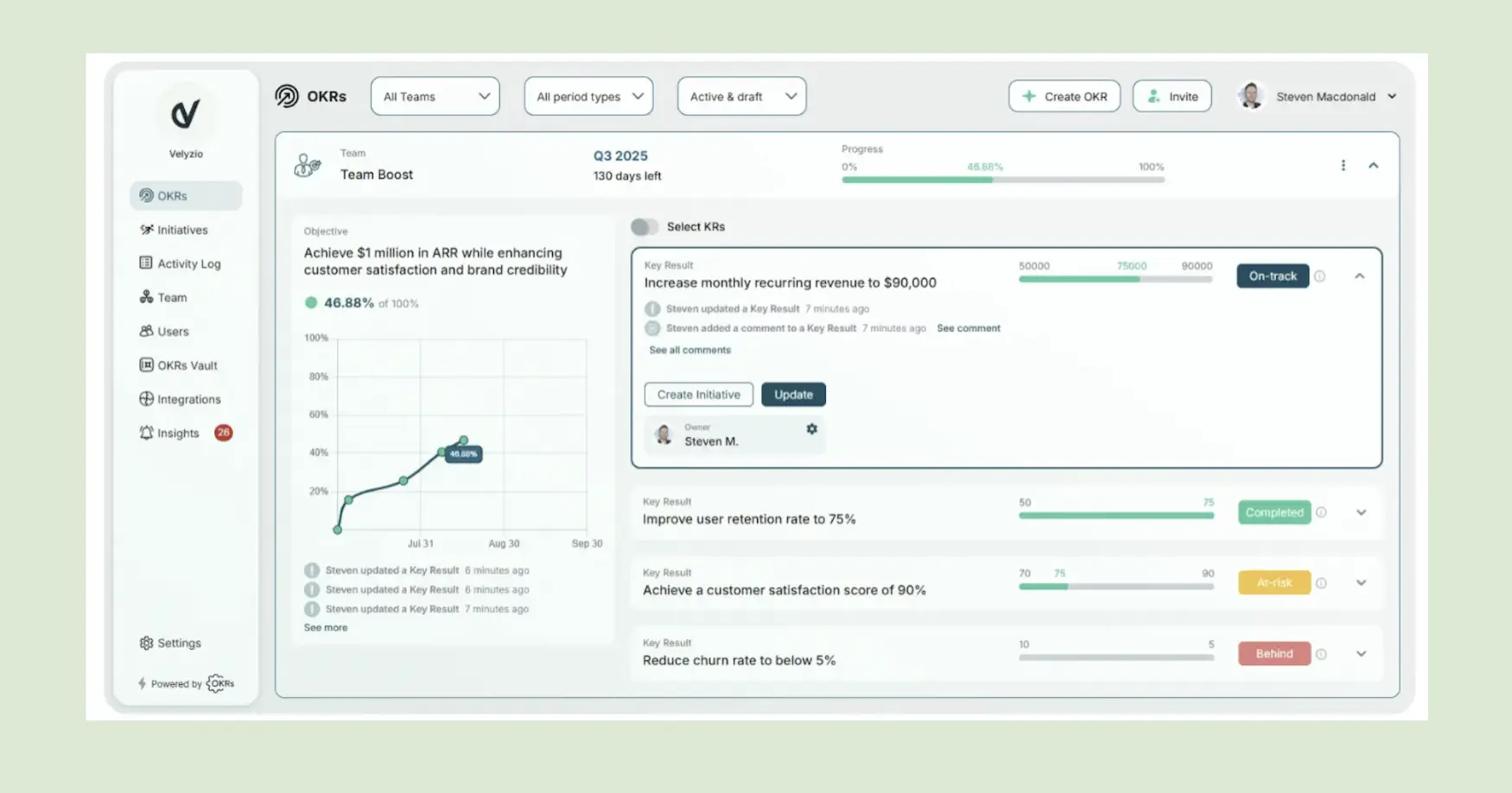
Key Features
- AI-Powered OKRs: Instantly create clear, tailored OKRs with AI-generated objectives, key results, and suggested initiatives that show teams exactly how to move goals forward.
- Real-Time Progress & Weekly Updates: Track OKRs and company KPIs in one place with live status, clear ownership, and automated weekly check-ins shared in Slack - so everyone stays aligned without manual follow-ups.
- OKR-Aligned Performance Reviews: Run lightweight performance reviews tied directly to OKRs, capturing self and manager feedback to reflect on outcomes and align on next-cycle priorities.
- Org-Wide Alignment & Simple Pricing: Visualize how goals connect across teams and cycles, and scale confidently with one flat, organization-based price - no per-user fees.
What we’re proud of
OKRs Tool is designed to feel lightweight and intuitive from day one. 93% of users create their first OKR in minutes. The AI helps you write sharper OKRs and even recommends focused initiatives to move each KR forward. It’s not just a goal tracker - it’s a decision-support system for growing startups.
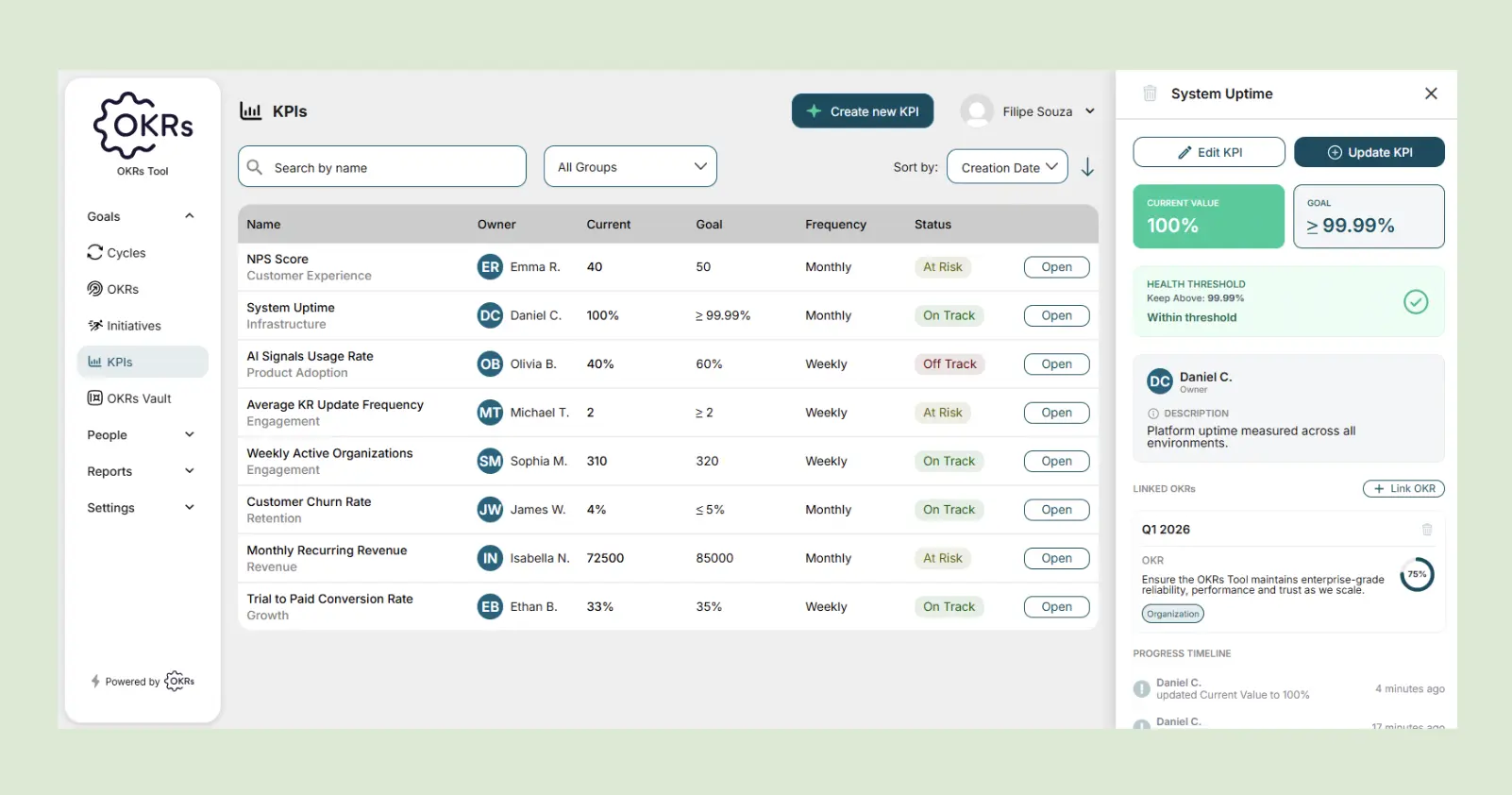
What makes OKRs Tool unique
Unlike traditional OKR software, OKRs Tool is built for execution, not just planning. It brings OKRs, KPIs, and performance reviews into one platform so teams stay focused and leaders see real progress. Pricing is simple and organization-based - not per user - so it scales as you grow, and OKR Adoption Insurance protects you if your team doesn’t fully adopt after rollout.
What could be better
We’re not focused on building dozens of integrations. We’re also not designed for organizations with 500+ users or specific enterprise requirements. If that’s what you’re looking for, I recommend choosing another platform from this list. OKRs Tool isn’t built for those needs - and using it that way will only lead to a poorer experience for you and your team.
Pricing
Free for up to 5 users. $30/month per org for Scale. $50/month perorgfor Expand.
Free trial
OKRs Tool is 100% free for 1-5 users. No trial or credit card required.

2. Mooncamp
Mooncamp is a simple, user-friendly OKR software designed to help teams set, track, and achieve their goals. It offers a clean, visual interface that makes it easy to create and manage OKRs and aligns them with strategic objectives.
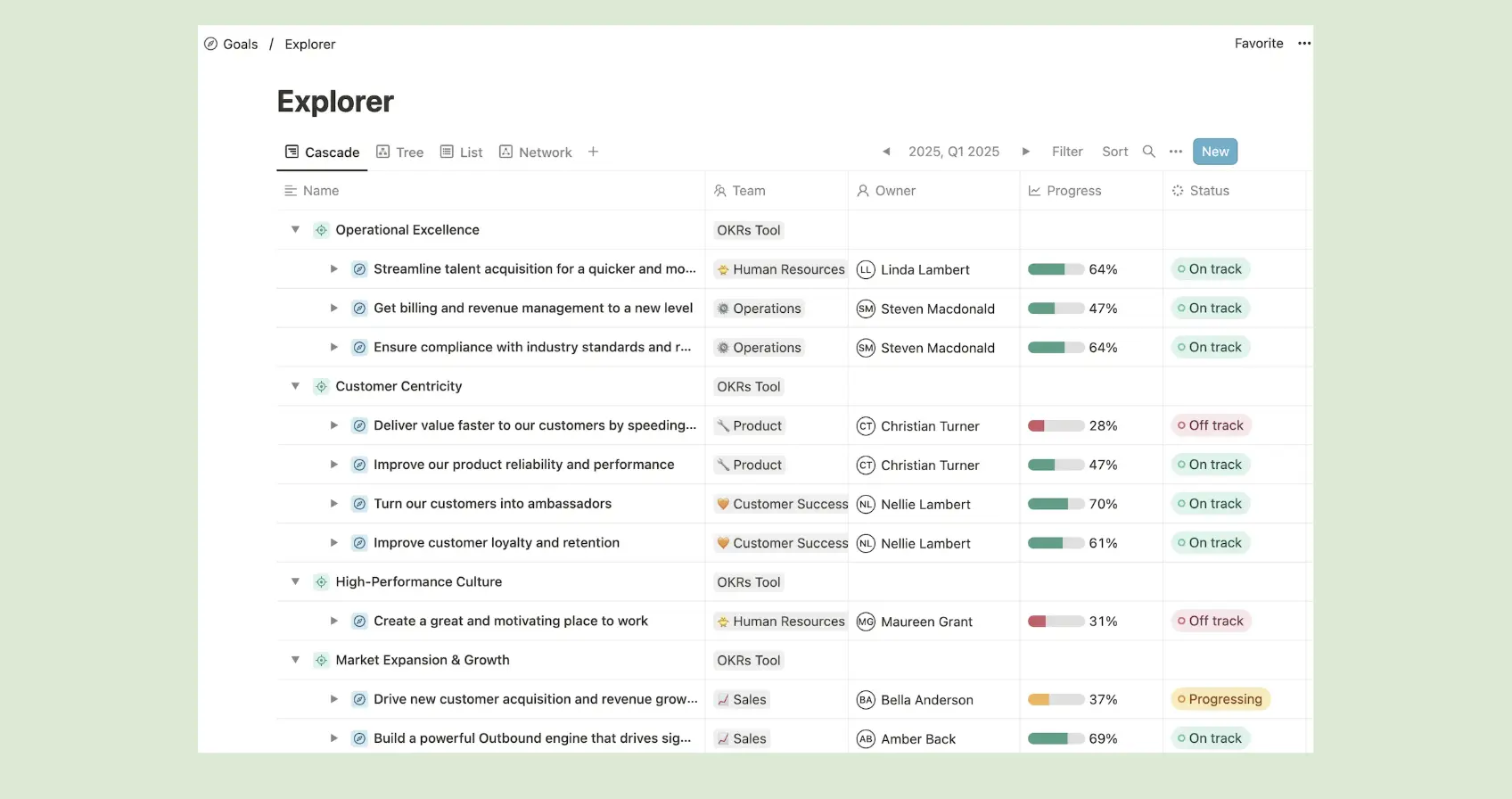
Great for startups, even better for mid-market and enterprises, Mooncamp is perfect for teams who want straightforward goal tracking so they can focus on what matters.
Key features:
- Visual OKR Setup: Easily create and visualize your OKRs with a simple drag-and-drop feature.
- Team Alignment: Align your team’s objectives and ensure everyone stays on track with shared goals.
- Progress Tracking: Track the progress of your OKRs in real time, with automatic updates.
What I liked
The strategy map is a great feature. It provides a clear view of how all the OKRs across your organization connect, without feeling overwhelming. As a founder, it’s easy to quickly assess how each team is performing and how their efforts contribute to the overall success of your startup.
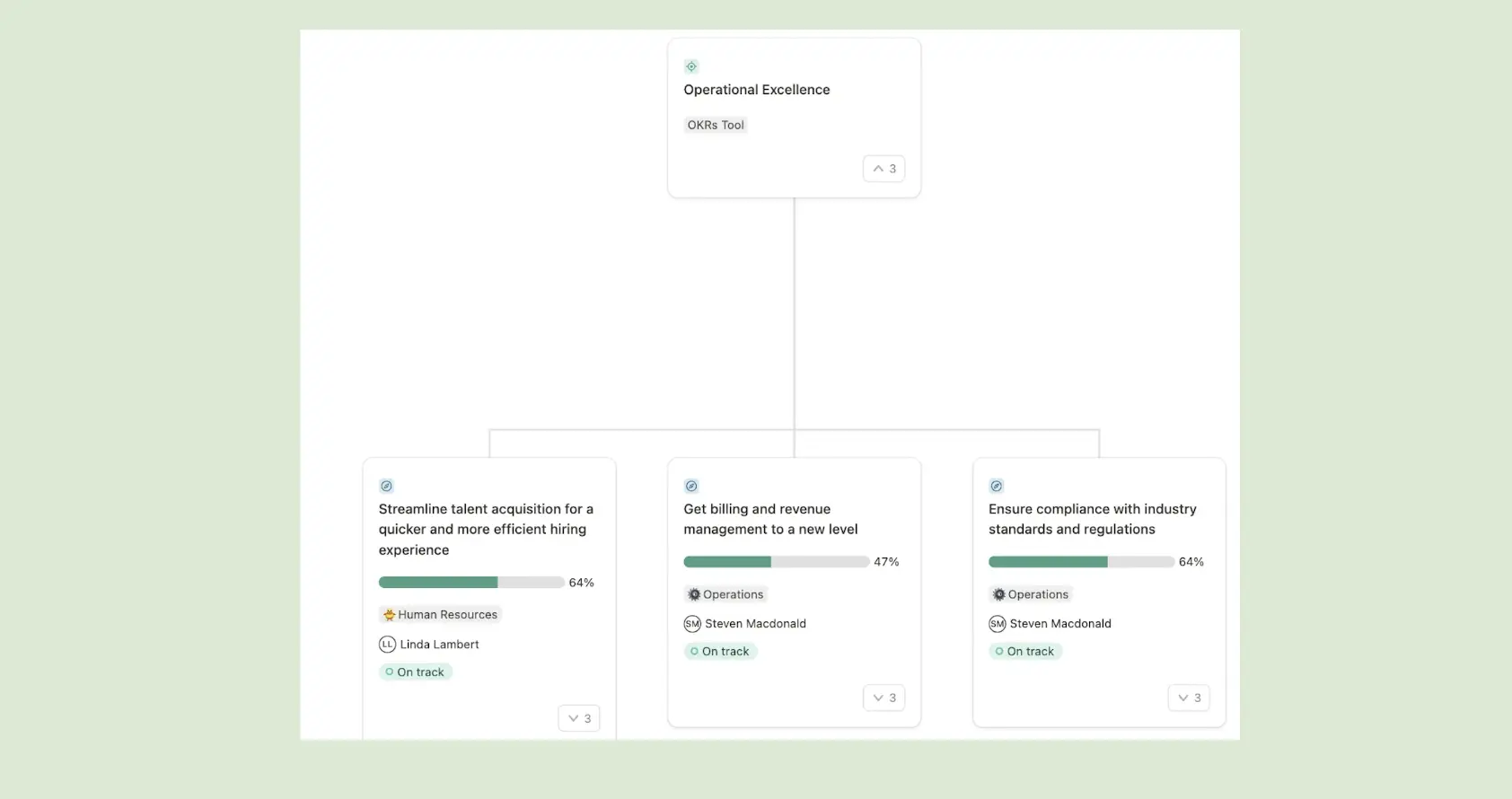
What could be improved
The sign-up dashboard could definitely use some work. It feels cluttered, and it's unclear where to click next. Plus, the sample data that’s pre-filled in is confusing, especially since I haven’t even set up my first objective yet. This doesn’t create the best first impression.
Pricing:
€6 per user, per month up to 5 users.
Free trial:
Yes, it’s free for 14 days.
3. Teamflect
Teamflect is an OKR and performance management software built specifically for Microsoft Teams. It’s designed to help companies set goals, track progress, and manage performance seamlessly inside the Microsoft ecosystem. If your team already lives in Teams, this tool feels like a natural extension.
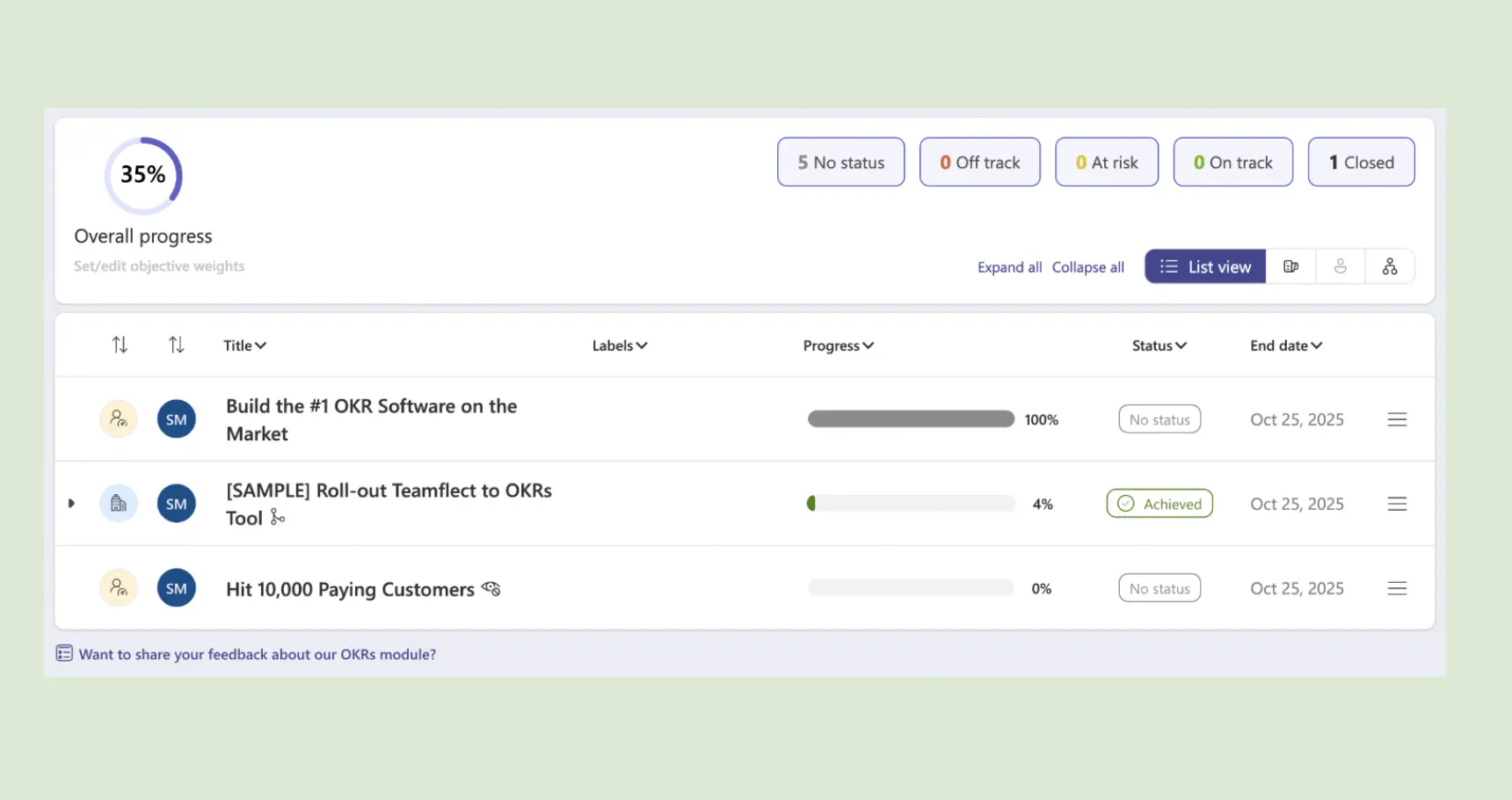
Teamflect shines for organizations that want tight Microsoft integration and a user-friendly way to manage OKRs, feedback, and performance reviews in one place.
Key features:
- Microsoft Teams Integration: Manage OKRs, feedback, and performance inside Teams.
- Status Filters: Quickly see which OKRs are on-track, behind, or at risk with simple filters.
- 360° Feedback & Reviews: Go beyond OKRs with feedback, recognition, and performance review tools built-in.
What I liked
The Microsoft integration is world-class - No other platform comes close. The ability to toggle OKR visibility between private and public during creation is a smart touch, especially for sensitive or in-progress goals. I also loved the status filters that instantly show which OKRs are on-track, behind, or at risk - perfect for managers who want a quick snapshot without deep diving into every goal.
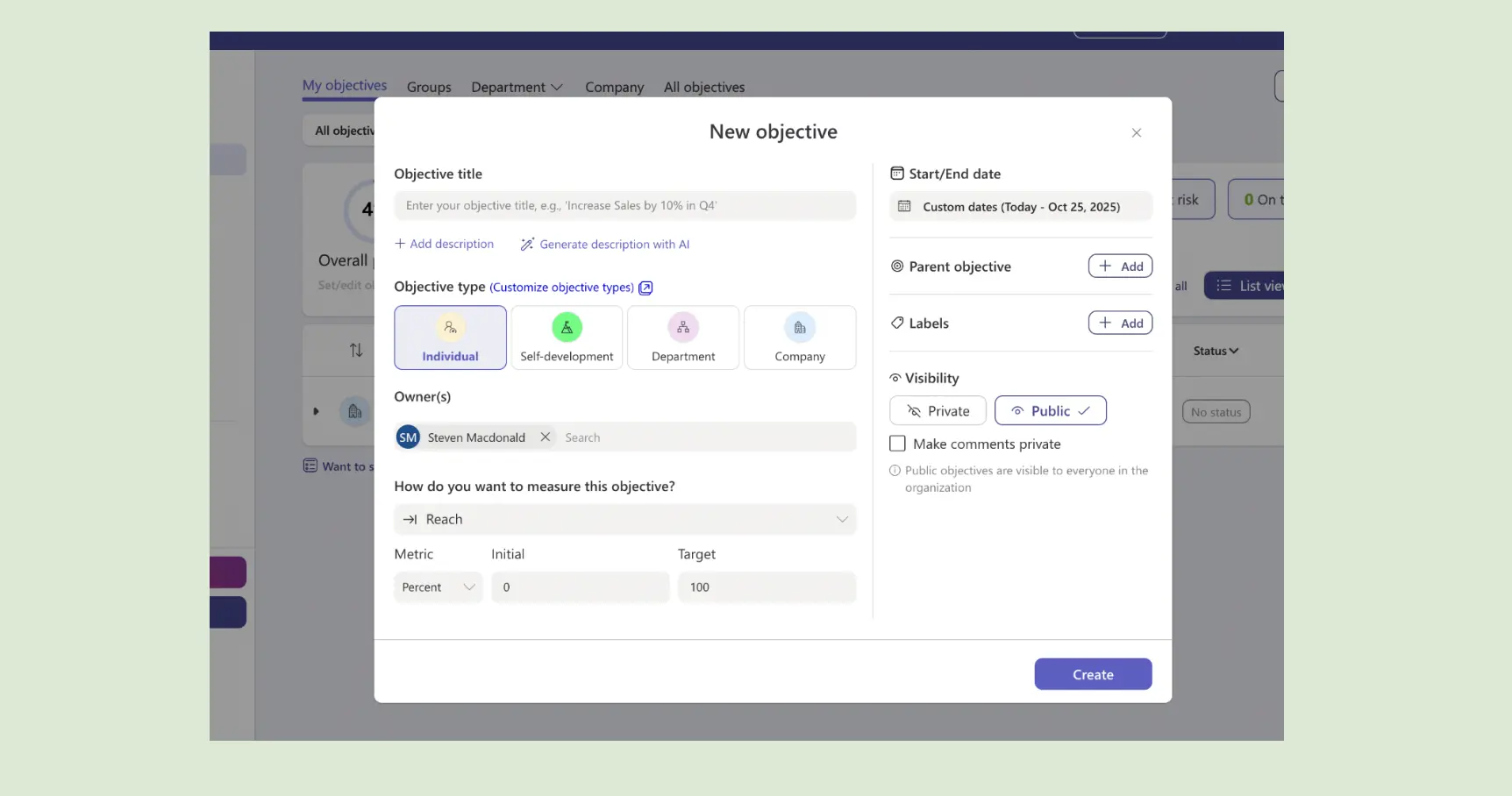
What could be improved
The progress update pop-up felt cluttered, and the UX here could definitely be simplified. Choosing cycles (like monthly or quarterly OKRs) wasn’t straightforward - I had to set custom dates manually, which made the process less intuitive than other platforms on this list.
Pricing:
Free for up to 10 users. Then $7 per user per month.
Free trial:
Yes - full-featured free plan for small teams (up to 10 users).
4. Tability
Tability is an intuitive OKR software that helps startups set OKRs and track progress in real-time. It’s designed for teams that need a simple, effective tool to stay aligned. It’s motto - “OKRs that don’t suck”
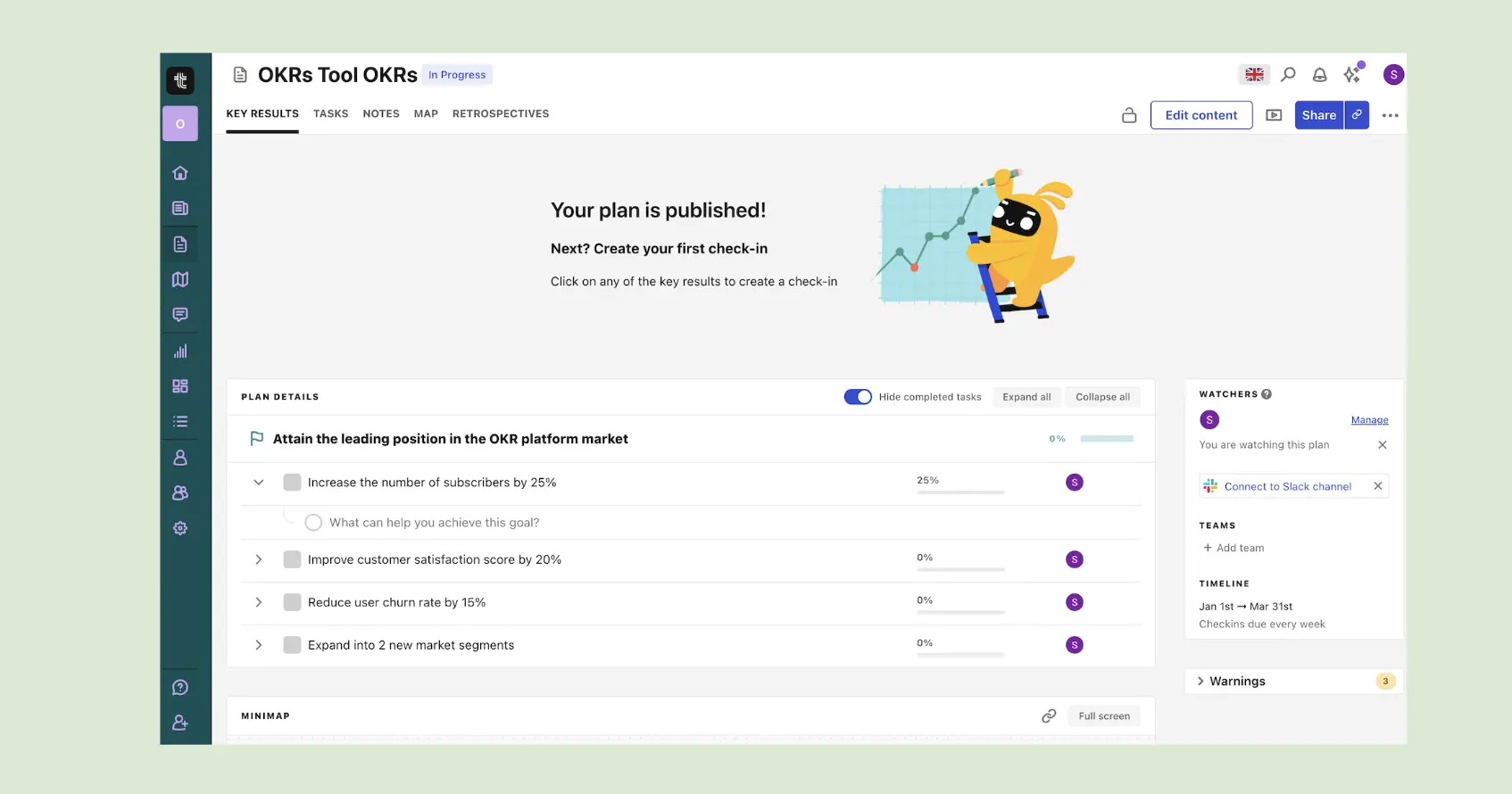
Tability is great for startups that want to quickly implement OKRs without the complexity of larger, enterprise-grade platforms. It’s ideal for teams who need basic, real-time progress tracking and goal alignment.
Key features:
- Real-Time Progress Tracking: Get live updates on how your team is progressing toward key results, ensuring that everyone stays on track.
- Weekly Check-ins: Automate weekly check-ins and updates to ensure consistent goal tracking without manual follow-ups.
- Customizable Goal Templates: Easily create and customize OKRs that fit your startup’s specific needs, streamlining goal-setting.
What I liked
The user interface is stunning, and the onboarding process was incredibly smooth. I was able to set up my OKR and start tracking key results almost immediately - no need for complicated tutorials or steep learning curves.
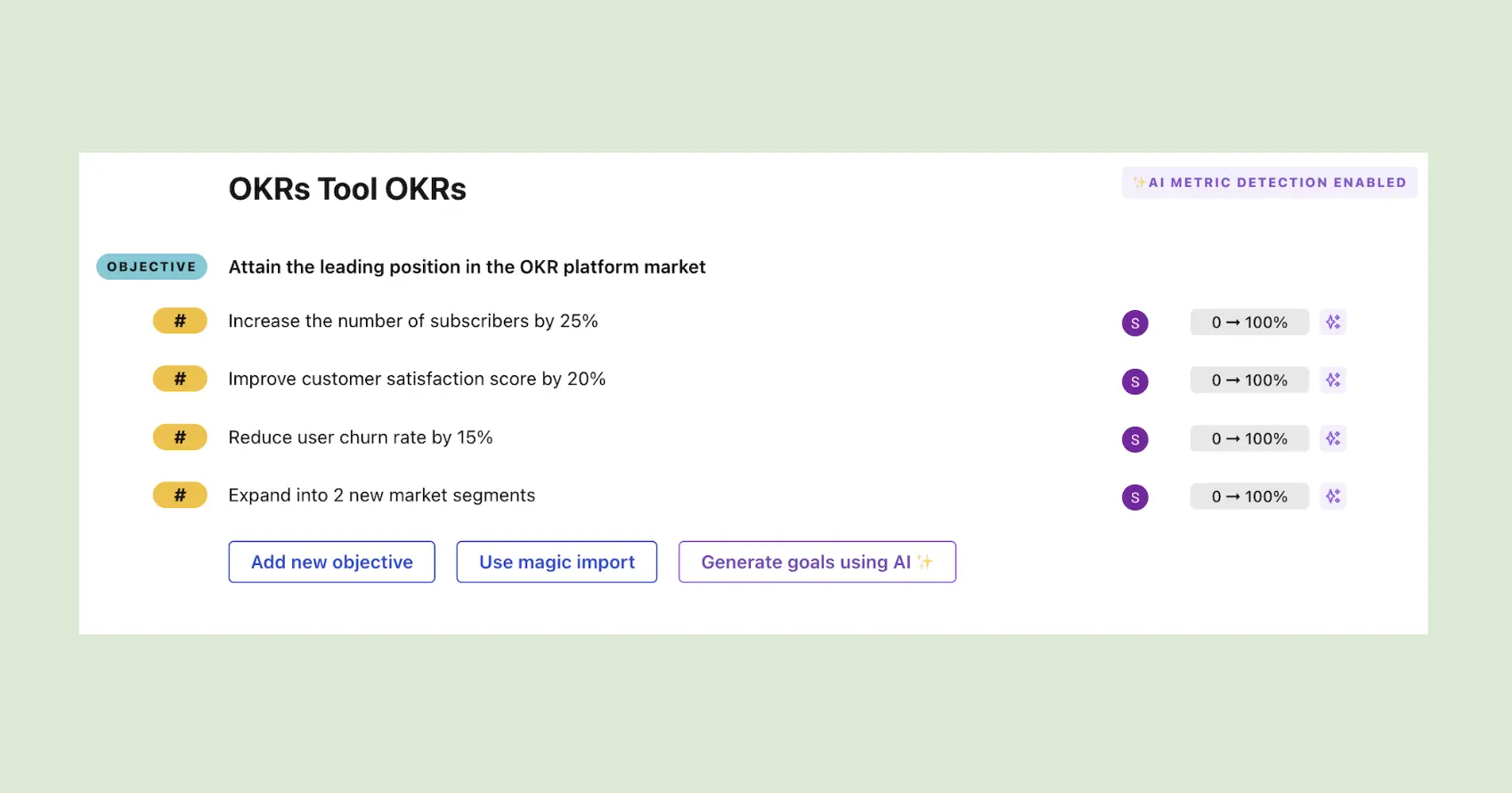
What could be improved
The platform offers a lot of options, which, at first, is great - but it can quickly become overwhelming. The side-bar, sub-side-bar, and various navigation elements had me clicking around for a couple of minutes before I found what I needed. While I eventually figured it out, the process wasn’t as intuitive as I’d hoped, and honestly, I’m not sure I’d have the patience to keep exploring if I wasn’t invested in finding the right tool.
Pricing
Starts at $6 per user per month (or $5 per user on an annual plan).
Free trial
Yes, it’s 14 days but you do need a credit card.
Recommended reading: Tability vs OKRs Tool: The Best Choice for Startup Growth?
5. Weekdone
Weekdone is a simple OKR and weekly reporting tool that helps teams stay aligned and track goals. It’s designed for startups that need a simple, no-frills way to set, track, and measure their OKRs.

Weekdone is great for small to medium-sized startups looking for an easy-to-use OKR tool with a focus on team alignment and weekly progress reporting.
Key features
- Weekly Reporting: Weekly check-ins make it easy to track team progress without waiting for long quarterly cycles.
- Goal Alignment: Align team objectives with the company’s goals, ensuring that everyone is working towards shared success.
- Progress Visualization: Get clear, visual feedback on how your key results are progressing, making it easier to stay on track.
What I liked
Weekdone’s statistics view is a fun way to track engagement. You can easily see things like user logins, OKR updates, and OKRs that need attention. It offers a great snapshot of how the team is interacting with OKRs and the platform. Plus, it helps you identify areas that may need more focus or attention, giving you a clear overview of your team’s progress.
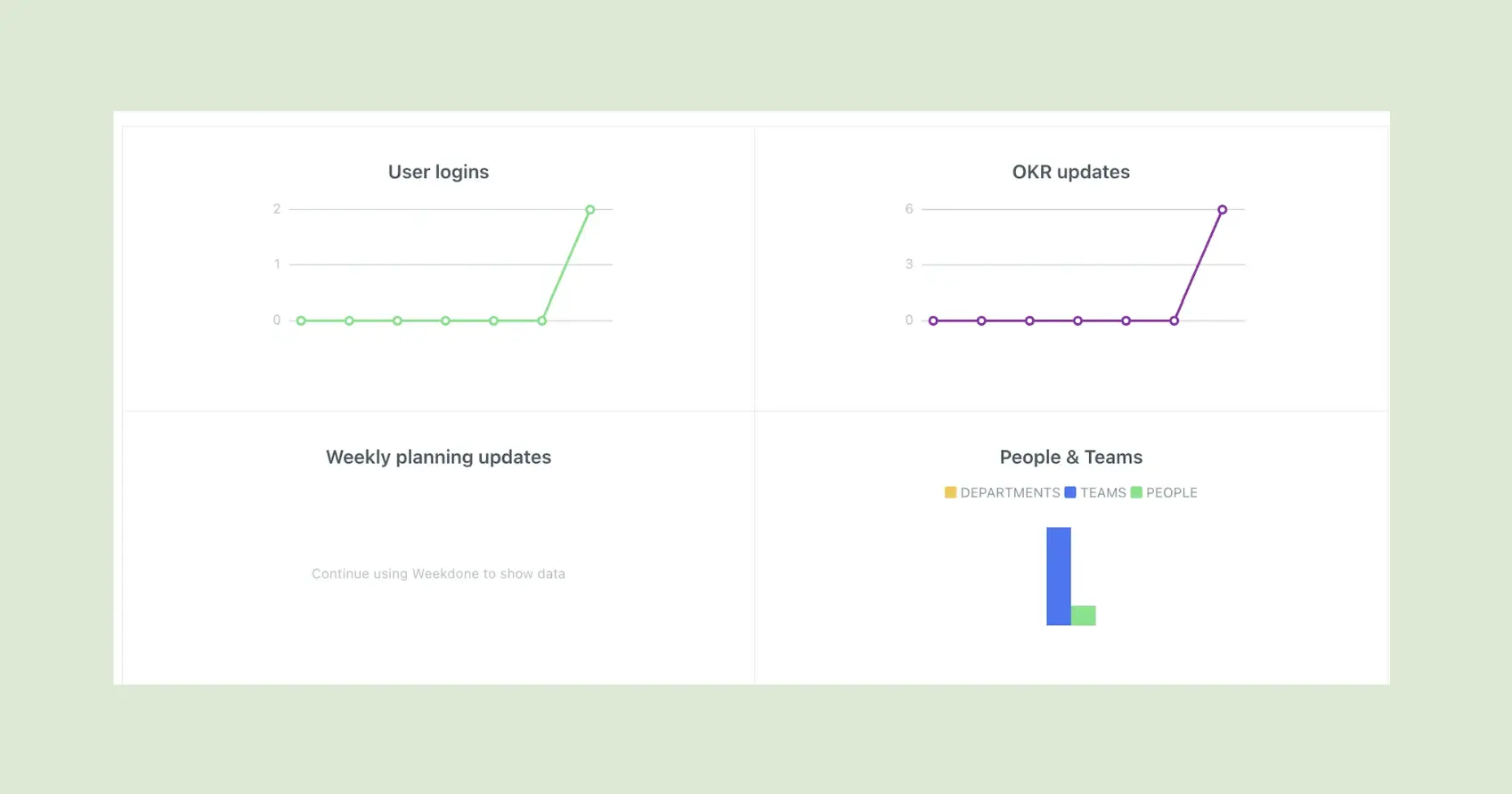
What could be improved
There’s a lot of clutter once you get past the clean onboarding. The initial setup was smooth, but after that, it felt like I had to click around and figure out where everything was. The platform wasn’t as intuitive as I expected, and it took me a bit longer than I’d like to get comfortable with navigating it.
Pricing:
Free for up to 3 people and $10 per month for teams of up to 10.
Free trial:
Yes
(Read: Explore our in-depth comparison of OKRs Tool vs. Weekdone here).
6. Perdoo
Perdoo is a goal-setting and OKR platform designed to help businesses of all sizes align objectives, track performance, and achieve their goals. It offers a range of tools for tracking progress, collaboration, and strategic alignment.
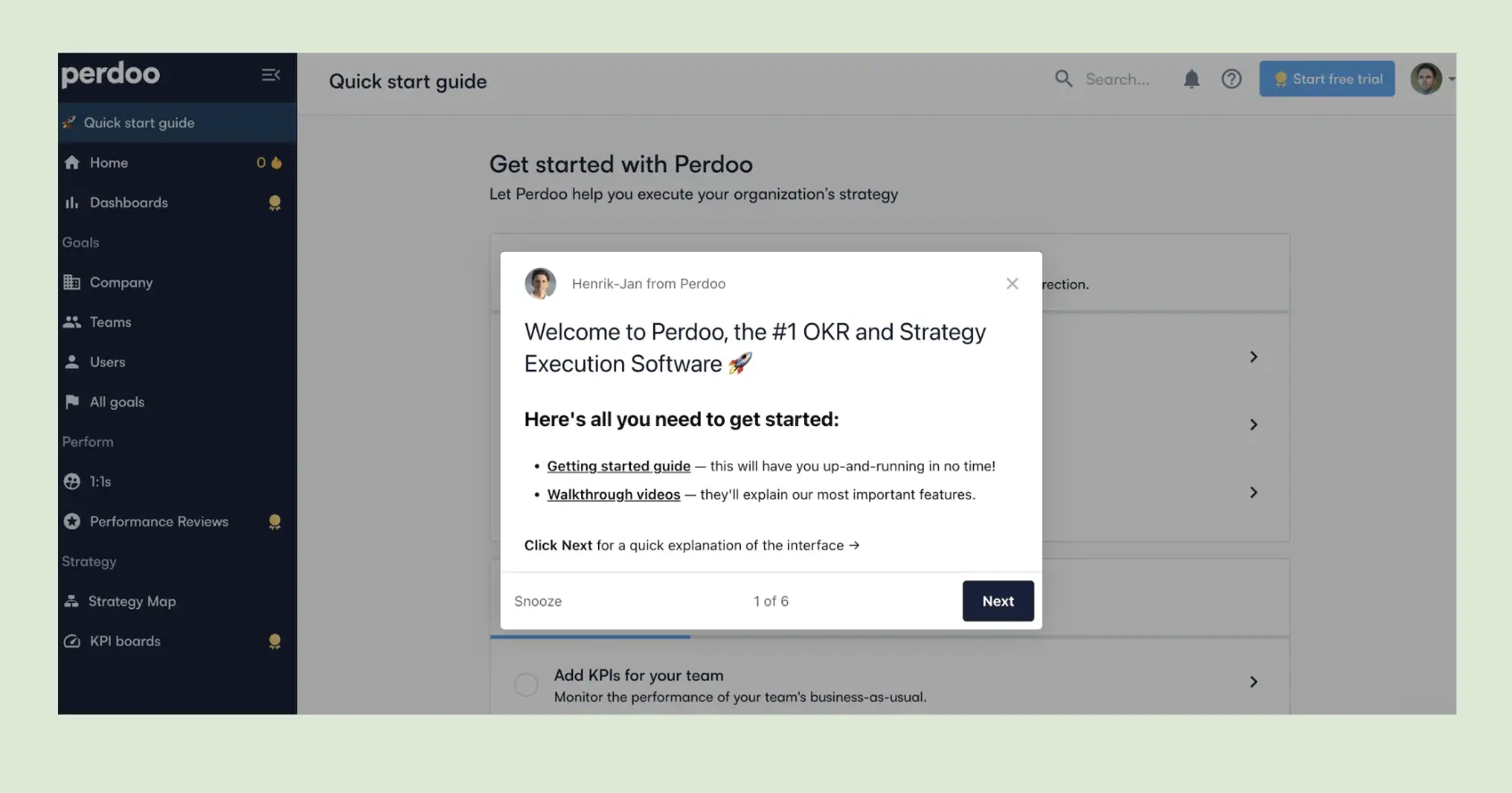
Perdoo is best for growing companies that need a comprehensive OKR platform with strategic alignment features and real-time tracking capabilities.
It's also worth noting that Perdoo functions as both an OKR platform and part of a broader performance management system, appealing to teams that want OKRs integrated with HR software and employee engagement tools.
Key features:
- Strategy map: Visualize how company-wide objectives break down into smaller, actionable goals.
- OKR & KPI Integration: Seamlessly link OKRs with KPIs to get a comprehensive view of both strategic goals and key performance metrics.
- Performance Reviews: Combine OKR tracking tools with performance management, offering a clear view of how individual performance aligns with broader goals.
What I liked
It’s a simple feature, but I really enjoyed the "Give Kudos" option. Just like reacting to Slack or Teams messages, you can do the same when colleagues update their OKRs. It’s a fun and easy way to keep engagement high and motivate the team.
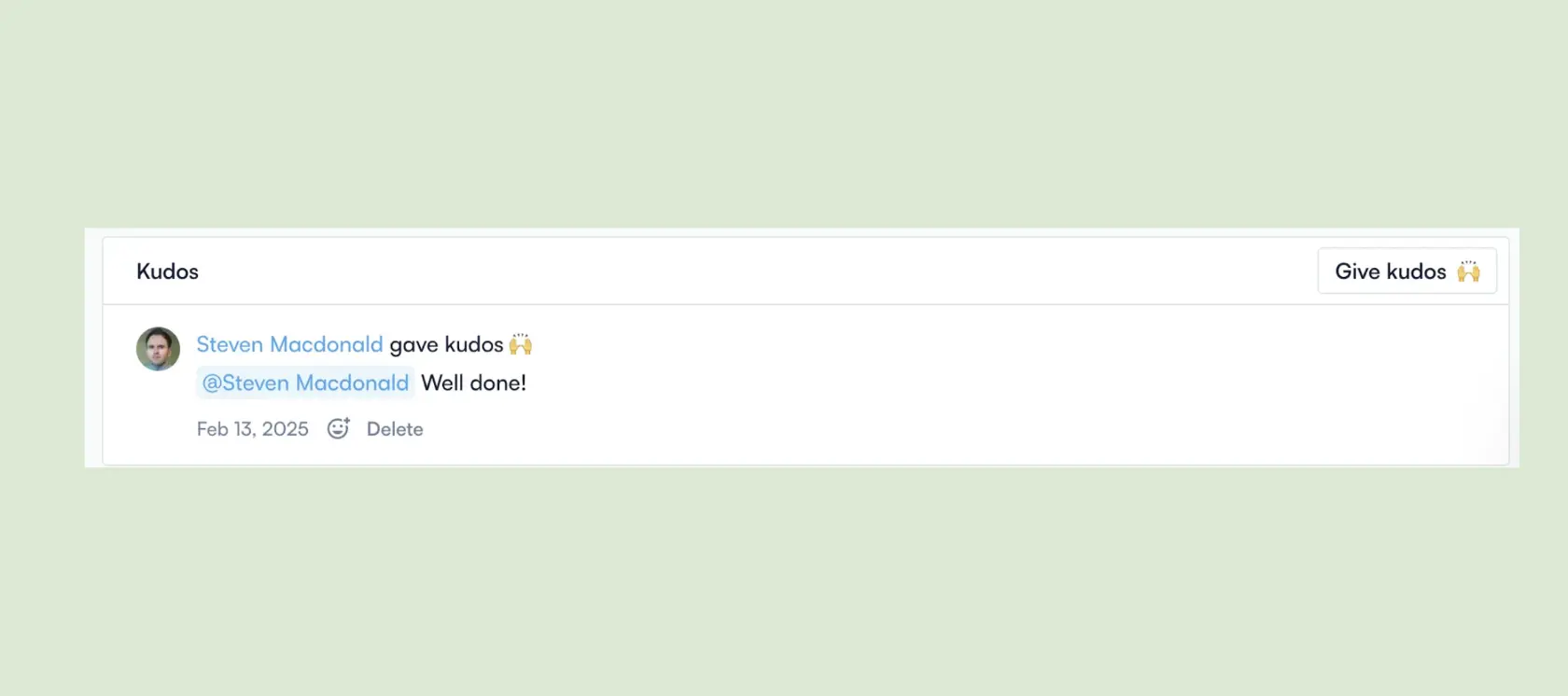
What could be improved
While Perdoo is marketed as an OKR platform, I found that KPIs take up a lot of space too. Sure, they’re linked to OKRs, but having them pushed so prominently sometimes got in the way of managing and updating the OKRs themselves. A few times, the KPI report was more prominent in the dashboard than the OKR section, which felt a bit off.
Pricing:
Free up to 5 users, and then €8 per user up to a team of 10.
Free trial:
Yes.
Read our full breakdown to see how Perdoo stacks up against OKRs Tool.
7. Synergita
Synergita is a people management platform that integrates OKR tracking with employee performance management. It allows businesses to track individual performance and link it to team objectives, creating a comprehensive view of progress and development.
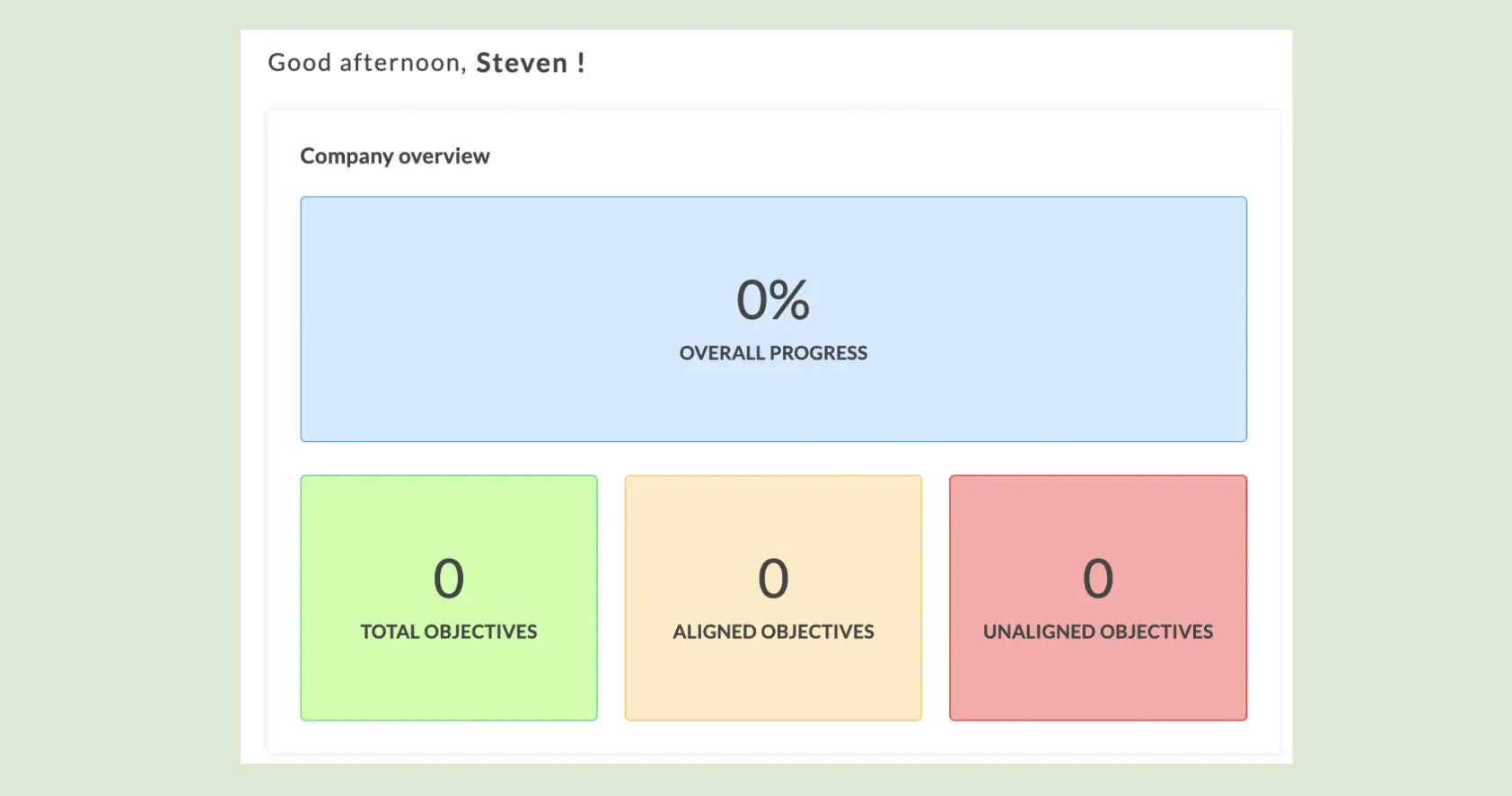
Synergita is great for startups that want to combine OKR tracking with performance management. It’s ideal for companies that are focused on employee development alongside team goal achievement, especially those with growing teams.
Key features:
- OKR & Performance Management Integration: Track team and individual OKRs alongside performance reviews.
- Employee Development Plans: Create customized growth plans for employees based on OKR progress and feedback.
- Real-Time Feedback: Provide continuous feedback to employees about their OKRs and overall performance.
What I liked
Synergita is incredibly user-friendly, with a simplicity that sets it apart. It didn’t take me long to create an objective, and I wasn’t overwhelmed by the process. Within just 1-2 minutes, I was up and running.
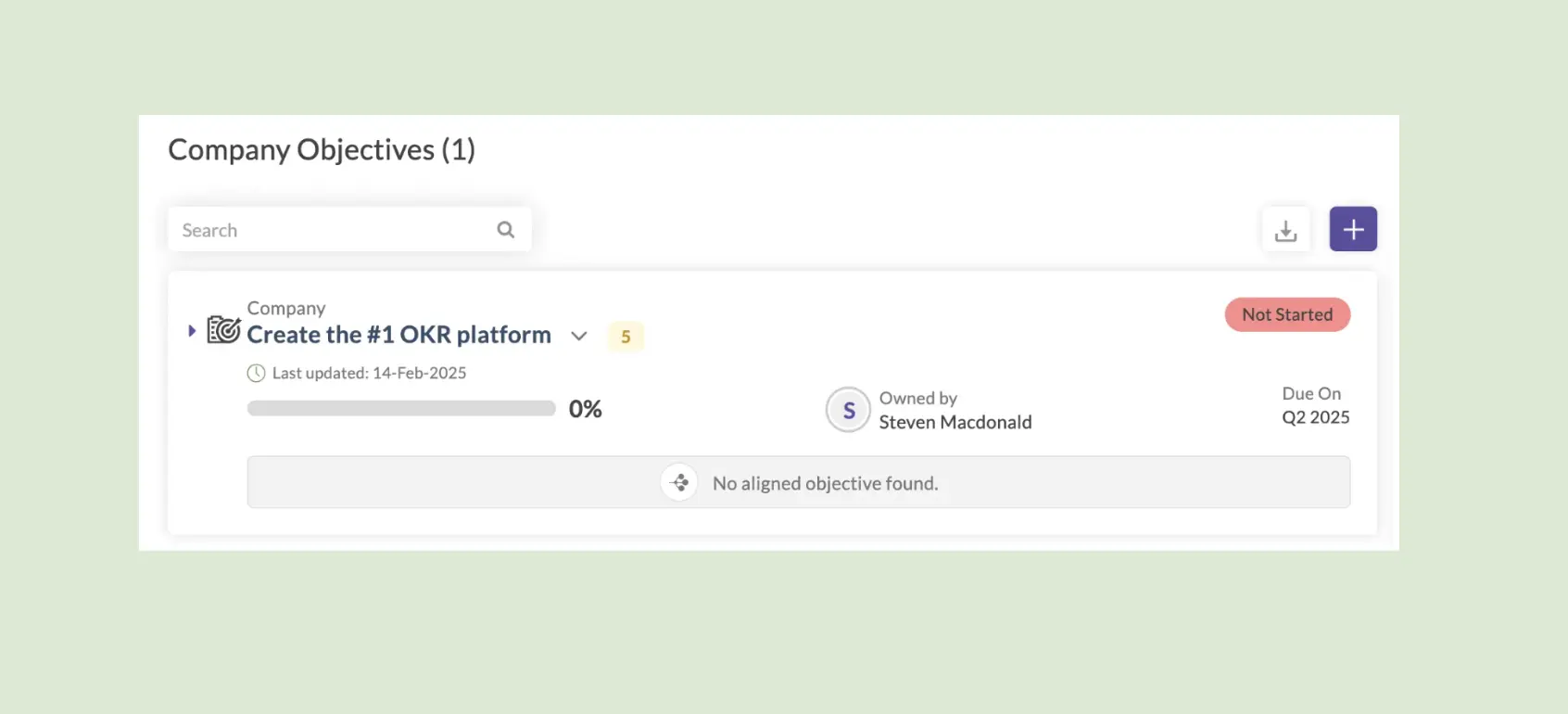
What could be improved
While launching my OKR was simple, updating it proved a bit trickier. I couldn’t figure out how to track progress. I could edit and close the objective, but I couldn’t update my progress. Additionally, I found the navigation bar with company, team, and individual objectives a bit confusing, especially for smaller teams where this level of detail isn’t necessary.
Pricing:
Free forever, but limited to one company objective.
Free trial:
Yes, offers a 7-day free trial for new users.
8. SugarOKR
SugarOKR is an easy-to-use OKR platform designed to help startups and growing teams track their objectives and key results.It provides simple goal-setting tools with a focus on aligning teams and increasing productivity.
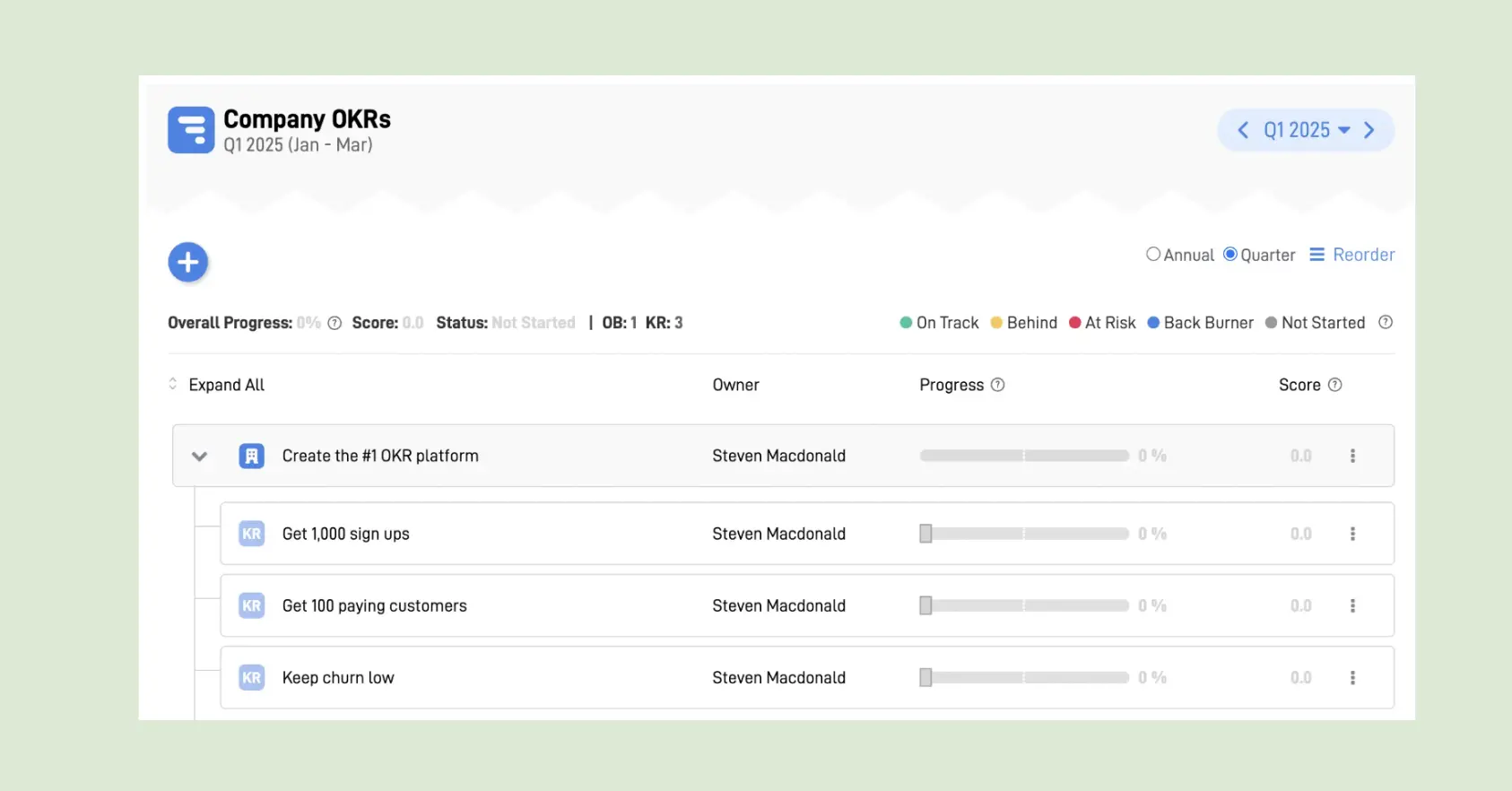
SugarOKR is ideal for startups and small to medium-sized businesses looking for an easy-to-use OKR platform to stay aligned and track progress without getting bogged down in overly complex features.
Key features:
- Simple OKR Setup: Quickly create and assign OKRs to team members with an easy-to-follow interface.
- Real-Time Progress Tracking: Monitor progress towards goals in real-time and get instant updates on changes.
- Team Alignment: Align teams to specific goals and keep everyone on the same page to ensure no one is left behind.
What I liked:
SugarOKR’s progress bar slider is a delight. The simple colour coding - red, yellow, green - makes it easy to quickly update key result progress. I also appreciate the status labels they use, such as "On track," "Behind," "At Risk," and "Back Burner" (for goals no longer a priority).

What can be improved:
While the simplicity is a big plus, it does lack some basic features offered by other platforms in their free plans. For example, I’m not sure I can "check-in" and add a note about what I’ve been doing or have done to progress toward my goal.
Pricing:
SugarOKR offers a limited free plan. Pricing for their paid plan is available on request.
Free trial:
Yes, SugarOKR offers a free trial for new users.
9. SimpleOKR
SimpleOKR is a lightweight OKR platform built for startups looking for simplicity and efficiency. It focuses on offering a clean interface and straightforward OKR management without overwhelming users with advanced features.
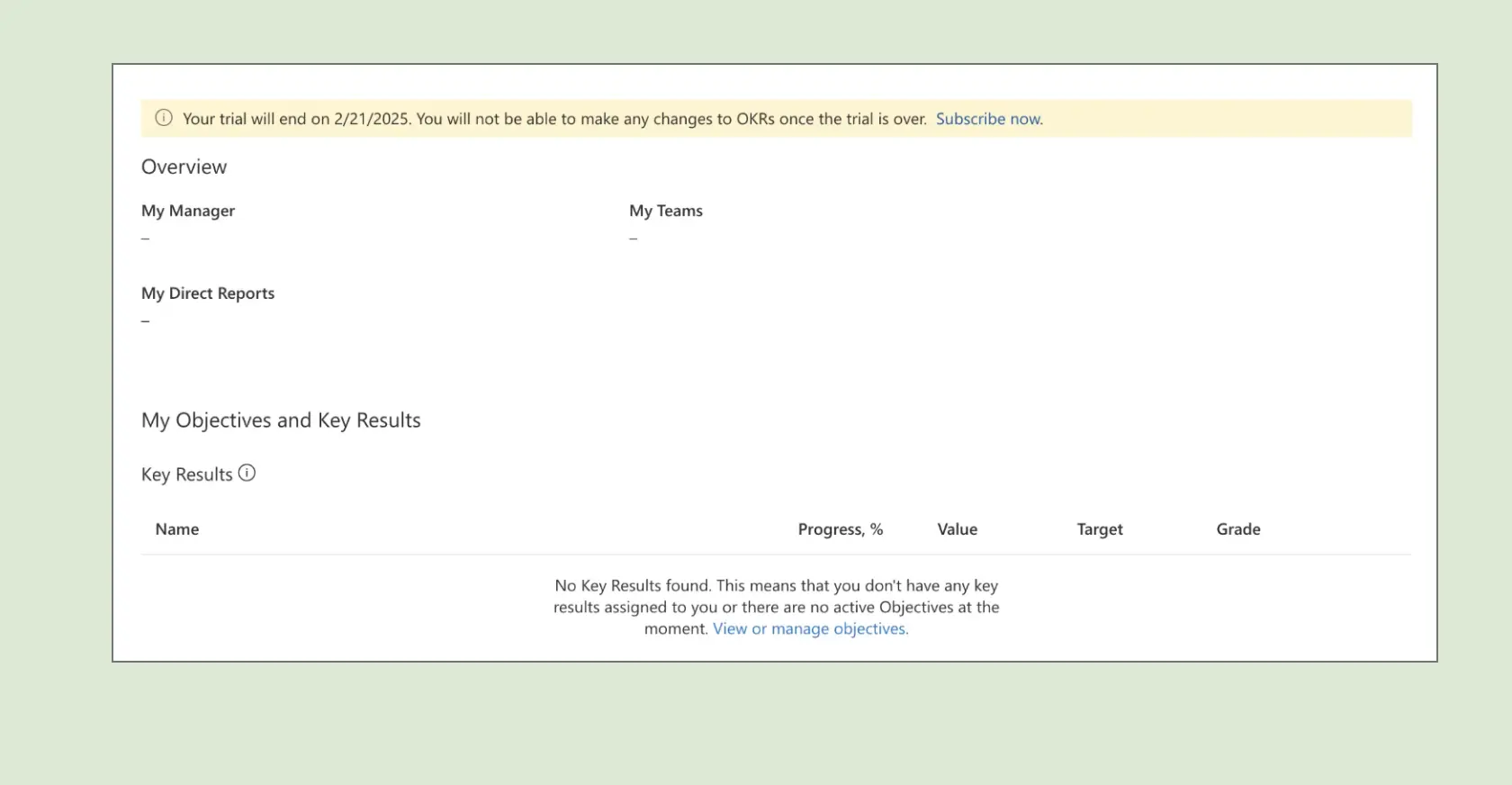
SimpleOKR is for early-stage startups or small teams that want to get up and running quickly with OKRs. It's perfect for organizations that are just starting to implement OKRs and don’t need a lot of bells and whistles.
Key features:
- Easy OKR Setup: Create, assign, and track OKRs with just a few clicks. No complicated setup or onboarding required.
- Progress Tracking: Simple and clean progress bars show how far you are from achieving your key results.
- Team Visibility: Share OKRs across teams so everyone knows what others are working on, helping you stay aligned.
What I liked
Honestly, I struggled with this. It’s simplistic - perhaps too simplistic - but I do appreciate the pricing model. One price, unlimited users, which is great for startups looking for an affordable, no-frills solution.
What can be improved:
SimpleOKR is transitioning to a new UX, so you have access to both the old and the new versions. I’d recommend trying the new one immediately, as the old version feels quite basic. They could also improve their reporting since, currently, there’s none available.
Additionally, I found it strange that any OKRs I created during the trial couldn't be edited once I subscribed. That felt a bit odd!
Pricing:
SimpleOKR has pricing that’s… simple. It’s one price - $49.99 per month.
Free trial:
Yes, SimpleOKR offers a free 7-day trial for new users.
10. Oboard.io
Oboard.io is a modern OKR platform focused on helping teams set and track goals with clarity and ease. It offers a user-friendly dashboard to monitor objectives, ensuring everyone is aligned and working toward shared goals.
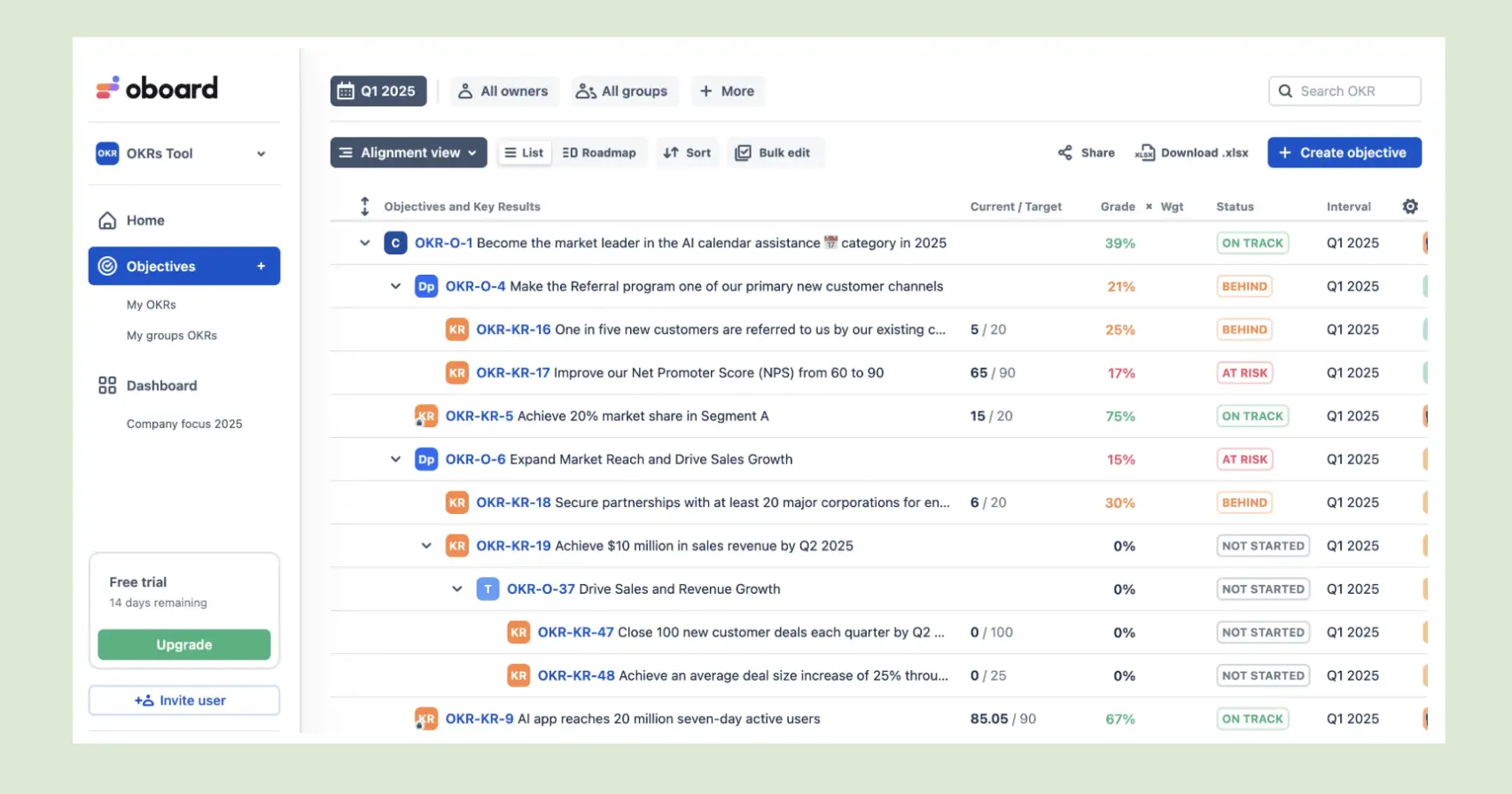
Oboard.io is designed for startups that want a visual and straightforward OKR tool to keep their teams aligned and engaged. It's perfect for companies that need a simple yet effective OKR platform that doesn’t require complex configurations.
Key features:
- Visual OKR Dashboard: The clean, easy-to-navigate dashboard allows you to quickly see OKR progress and team alignment.
- Real-Time Tracking: Track the progress of your OKRs instantly and receive immediate updates when there are changes.
- Team Collaboration: Share and discuss OKRs across teams to ensure transparency and alignment.
What I liked
Creating an OKR was super simple. The process was intuitive, and I had a new OKR up and running in minutes. Plus, I loved the comments section where you can celebrate milestones and updates, making it easier to keep everyone motivated and engaged.

What could be improved
There’s a lot of clutter on the platform, which was overwhelming for me as a new user. It felt like there were too many buttons and colors, making it hard to know where to click first. I almost missed the "Create Objective" button, which should be more prominent.
Pricing:
Pricing starts at $6 per user, per month.
Free trial:
Yes, Oboard.io offers a free trial (although it says 30-day trial on the home page and then 14-day trial during sign up).
11. Cascade
Cascade is a strategy execution platform that goes beyond traditional OKR tracking tools. Designed for startups and scaling businesses, it helps teams align, track, and execute their strategic goals with a structured, data-driven approach.
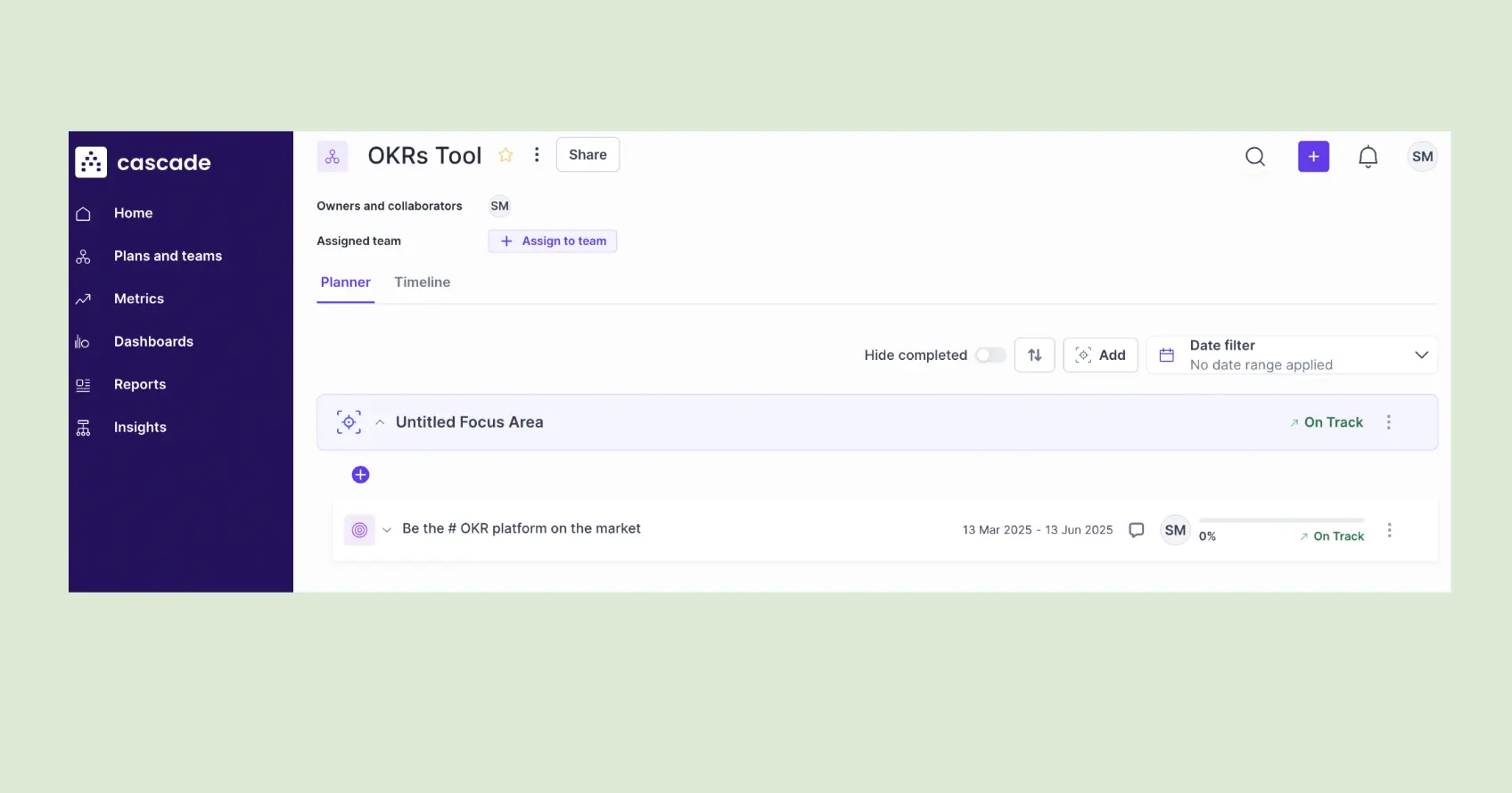
Cascade is ideal for companies looking for more than OKR software. It combines goal-setting with performance tracking, project management, and data visualization, making it a robust tool for teams that want a structured approach to strategy execution.
Key Features:
- Strategy mapping: Define high-level business goals and break them down into measurable OKRs to drive execution.
- Data-driven insights: Built-in analytics and reporting to track progress and identify bottlenecks.
- Integration with workflows: Seamlessly connects with tools like Salesforce, Asana, and SAP for smooth collaboration.
What I liked
Cascade offers the best onboarding experience of any platform I’ve used. It was incredibly intuitive - just a few simple questions, and I had my first objective and key result set up before even entering the app. The process felt seamless and quick, making it easy to get started without feeling overwhelmed.
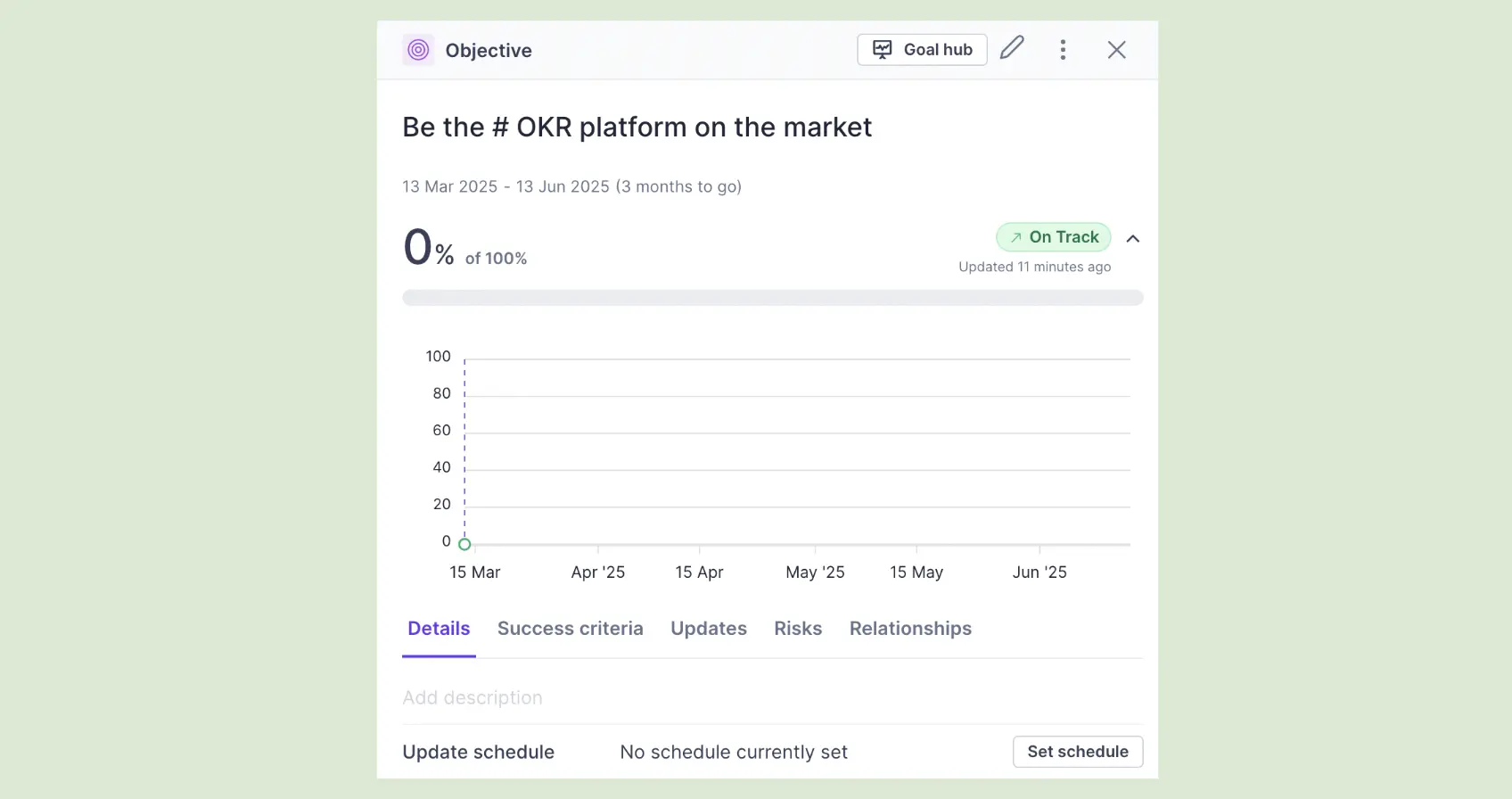
What could be improved
While Cascade is excellent for executing long-term strategies, it may feel overwhelming for startups looking for a simpler OKR solution. The platform offers robust features, but they might be too complex for those who need a straightforward approach.
Additionally, while the onboarding process was smooth, I found myself unsure of what to do next once inside the app. I opted for their "Start from scratch" option, instead of the playground (an interactive demo), which may have contributed to this feeling of uncertainty.
Pricing:
You will need to request a quote to see their pricing.
Free trial:
Yes, 14-day free trial available - no credit card required.
12. PeopleGoal
PeopleGoal is a customizable performance management platform built for startups that want OKRs without rigid processes. It combines goal-setting, feedback, and engagement tools in one place, with real-time tracking and integrations that keep teams aligned.

What makes PeopleGoal stand out is its built-in App Store. Startups can quickly add workflows like onboarding, recognition, or pulse surveys - no coding required.
Key features:
- Custom OKR Alignment: Set OKRs and SMART goals that cascade across teams.
- 360 Feedback Cycles: Collect input from peers, managers, and direct reports.
- Comprehensive App Store: Add plug-and-play HR apps in minutes.
What I liked
The App Store really sets PeopleGoal apart - no other OKR platform offers anything quite like it. Rather than locking you into a rigid process, it gives you the flexibility to build workflows that fit your startup. Combined with OKRs, feedback, and engagement tools, it goes well beyond basic goal tracking.
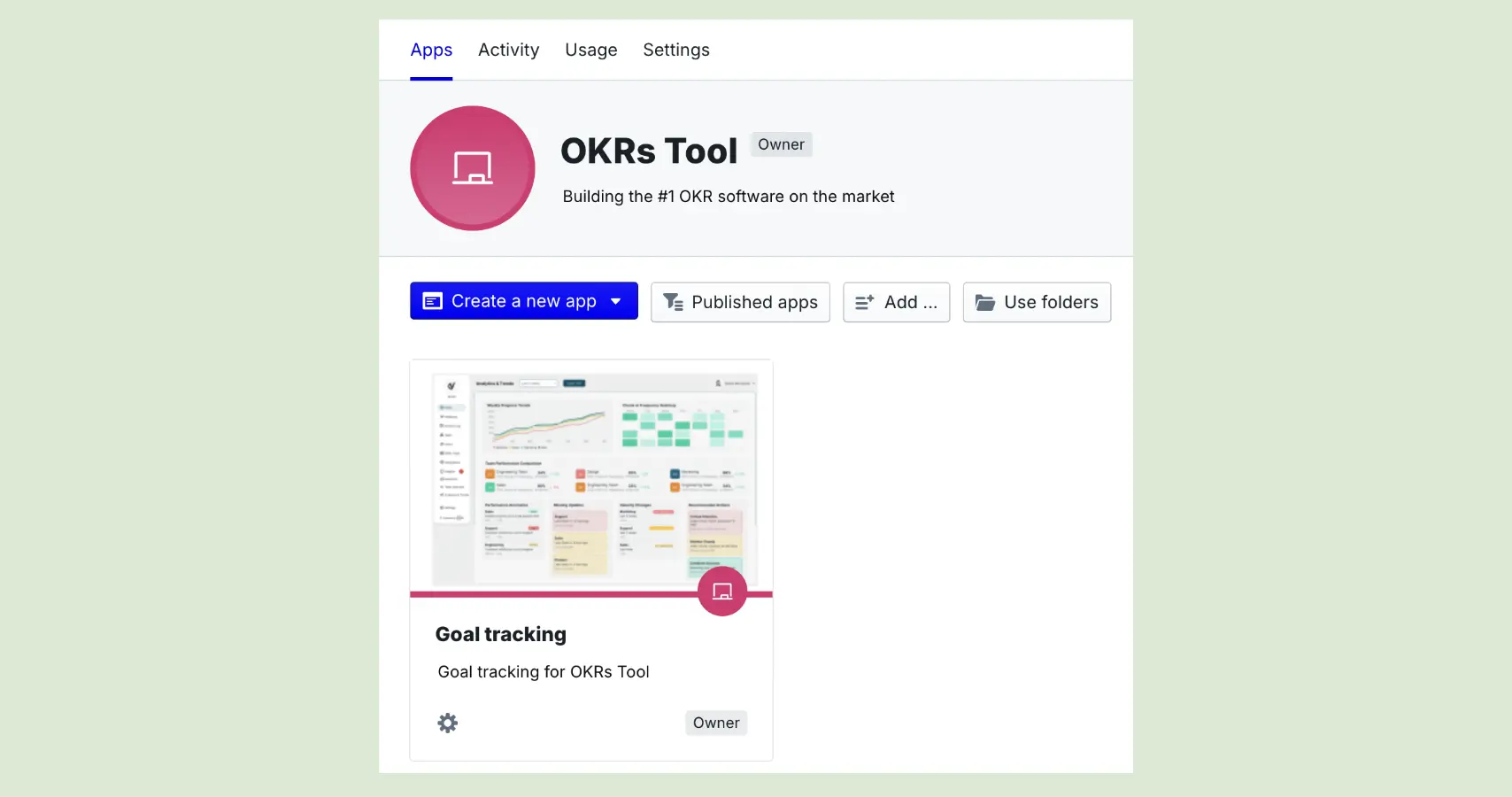
What could be improved
That being said, the platform has a learning curve - especially when figuring out which apps to set up and how they fit together. A dedicated customer success manager would really help streamline onboarding and save time (their team did reach out to me after sign up).
Pricing
Starts at $4 per user per month (minimum charge $199/mo).
Free trial
Yes, 7 days.
13. Primalogik
Primalogik is a performance management platform designed to help businesses streamline employee feedback, engagement, and goal tracking. It provides tools for performance reviews, 360-degree feedback, and surveys to improve organizational alignment and employee development.
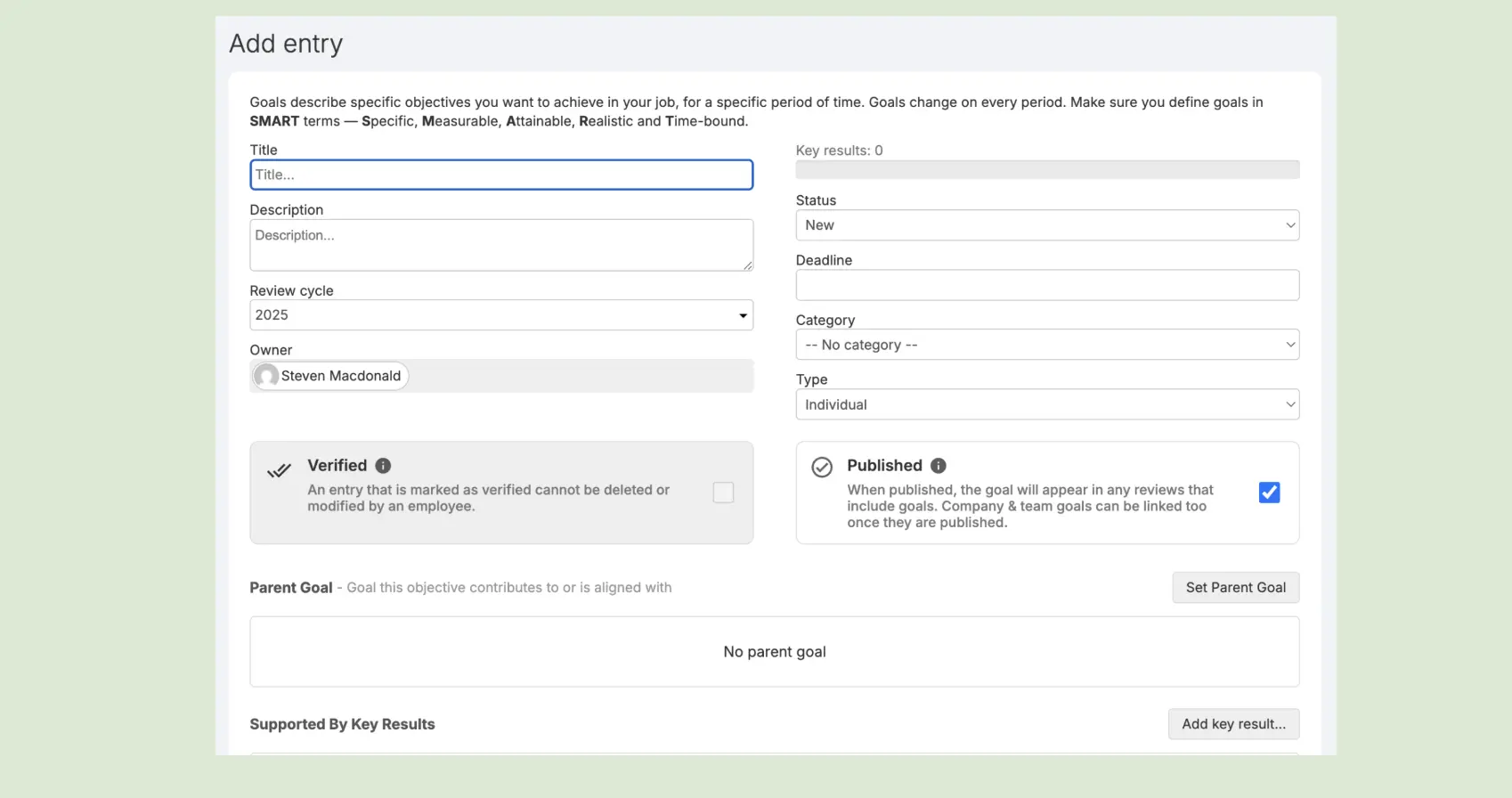
Ideal for HR teams, managers, and business leaders, Primalogik simplifies performance management by offering an easy-to-use platform for tracking employee progress and gathering actionable insights.
Key Features:
- 360-Degree Feedback – Collects performance insights from multiple sources, enabling targeted development plans and continuous progress tracking.
- Goal Management – Allows organizations to set, track, and evaluate employee goals, integrating seamlessly into performance reviews for ongoing development.
- Performance Reviews – Facilitates effective one-on-one meetings and appraisals with tools to monitor employee performance and support long-term growth.
What I liked
I really like the idea of integrating surveys into the platform, something I haven’t encountered in other OKR tools. Primalogik makes it simple to create a survey and upload a list, allowing you to send relevant questions to the right people with ease. This feature adds a unique layer of engagement and feedback collection that improves the overall experience.
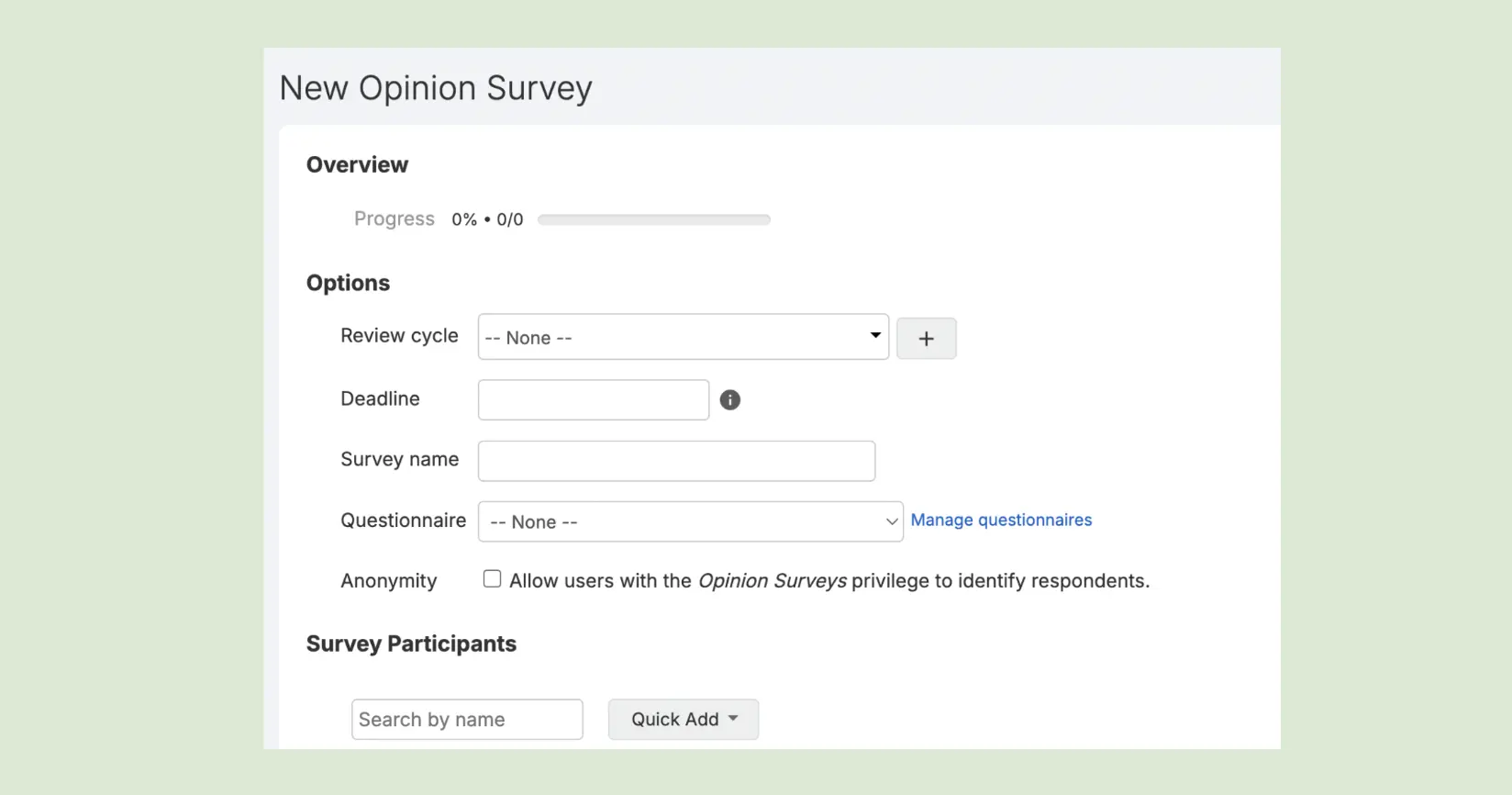
What could be improved
Like many OKR systems, Primalogik can overwhelm users with an abundance of features during the trial period. While I understand the intention to showcase all the platform’s capabilities, it quickly becomes confusing. For startups looking for something simple and straightforward, this can be a bit much and may create unnecessary complexity right from the start.
Pricing:
The OKR module - found in their performance plan- is between $4-8 per month, per user.
Free trial:
Yes - 30 day free trial available - no credit needed.
14. Allo.io
All.io is a goal-setting platform designed to help teams manage and track their OKRs in an intuitive and visually engaging way. With its streamlined interface, Allo.io makes it easy for startups and teams to stay aligned and focused on their most important goals.
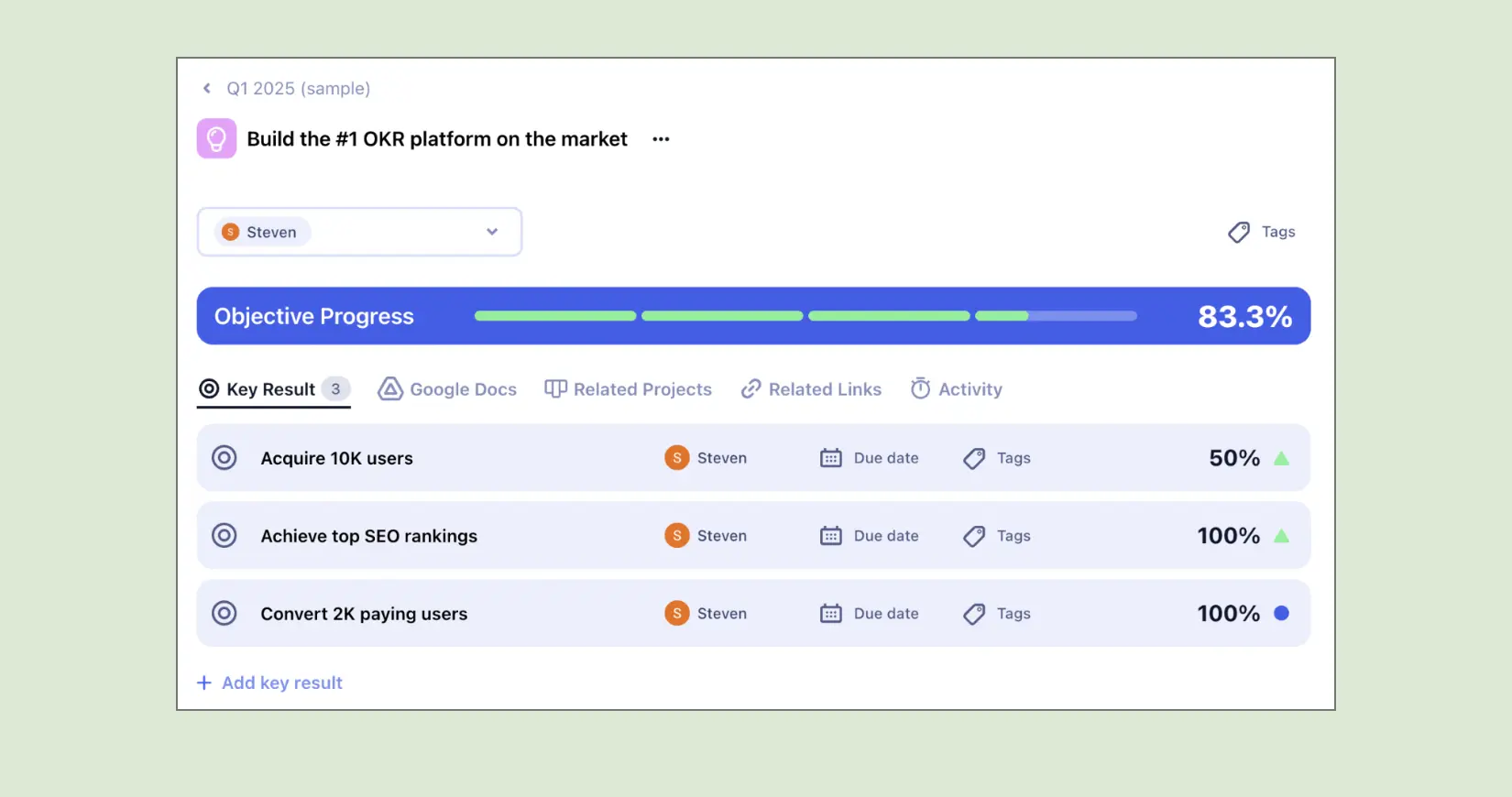
Ideal for founders, managers, and team leaders, Allo.io simplifies OKR management, offering a platform that keeps everyone connected and aligned, all while driving accountability and progress.
Key Features
- Visually Appealing OKRs – A visually engaging and interactive platform to share and track OKRs, improving alignment and team focus.
- Holistic View for Company and Goals – A dashboard with activity views for monitoring OKR progress and history, reducing unnecessary meetings.
- Simply Connect All Workflows into OKRs – Link OKRs to projects, files, and data for seamless navigation and efficient workflow integration.
What I liked
I really appreciated how intuitive it was to update key results and track progress. The user interface is sleek and visually appealing, making the process of managing OKRs much more engaging. With Allo, I can easily see both the overall progress of objectives and the status of each individual key result, which helps keep everything clear and organized.
What can be improved
One area for improvement would be the default OKR samples that appear upon login. There are quite a few of them, and it’s not immediately clear which ones are my own and which are just examples. I also couldn’t find a way to remove or hide them, which made the dashboard feel a bit cluttered and less streamlined.

Pricing:
OKRs are not included in the free plan, but you can add them as an add-on for $1.99 per month in the solo plan (which itself is $8.99 per user, per month).
Free trial:
Yes, 14-day free trial available - no credit card required.
15. Range
Range is an intuitive OKR and team collaboration platform that helps startups and remote teams set Objectives & Key Results, track progress, and stay connected. Its ethos is “making synchronous work feel asynchronous - and more human.”

Range is great for teams that want a clean, effective tool to manage OKRs, daily check‑ins, and meeting agendas - without the bloat of larger enterprise platforms.
Key features:
- Async Check‑ins & Mood‑Sharing: Automate daily or weekly updates, share moods, icebreakers, and blockers, fostering team trust.
- Meeting Agendas & Action Items: Build agendas collaboratively, facilitate meetings, auto-share notes and tasks - all within Range.
- Integrations Galore: Sync with Slack, MS Teams, Zoom, Google Calendar, Drive, PagerDuty, Trello, and more
What I liked
Range is fast. Every click feels snappy, and jumping between goals, meetings, and check-ins is seamless. Setting up a goal was straightforward, and I really appreciated being able to chat with their support team directly from within the app - it made the experience feel personal and responsive.
What could be improved
There’s no clear forecast or visualization for progress versus expected outcomes, which makes long-term tracking a bit fuzzy. I also couldn’t find a dedicated section for adding Key Results. There are “sub-goals,” which might serve the same purpose, but the distinction wasn’t clear.- some simplification or onboarding tips could go a long way.
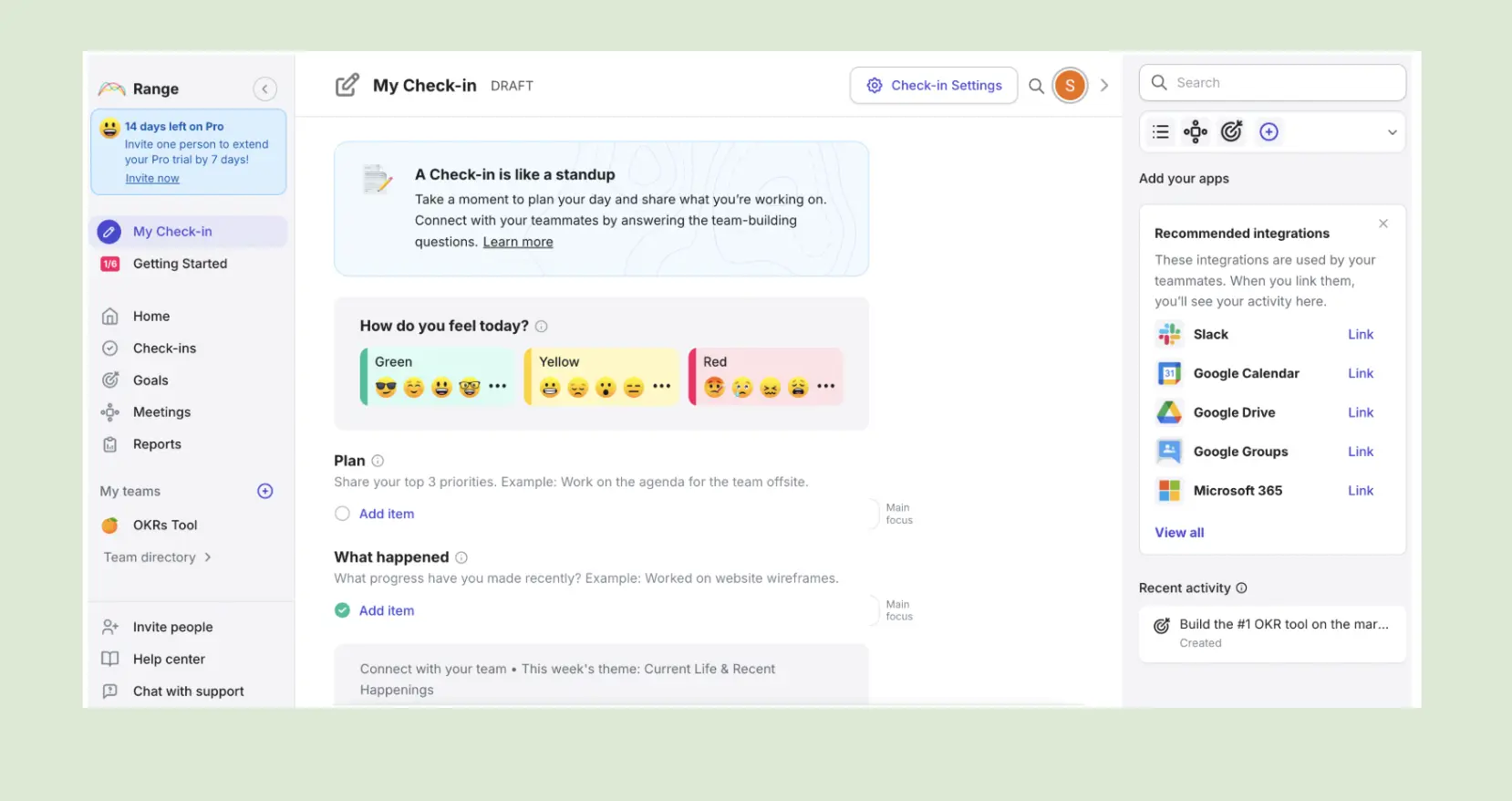
Pricing:
Range is free for 12 users, but there are limits (max 3 goals).
Free trial:
Yes. But it’s confusing as I signed up for the free version but within the dashboard, there was a 14-day countdown for when the trial ends.
16. Businessmap
Businessmap is a Lean/Agile strategy-execution platform (formerly Kanbanize) that empowers teams to set OKRs and turn strategic goals into everyday work—all within a clean, visual interface. Its motto? Align strategy with execution and help teams “do the work, monitor results, pivot when needed.”
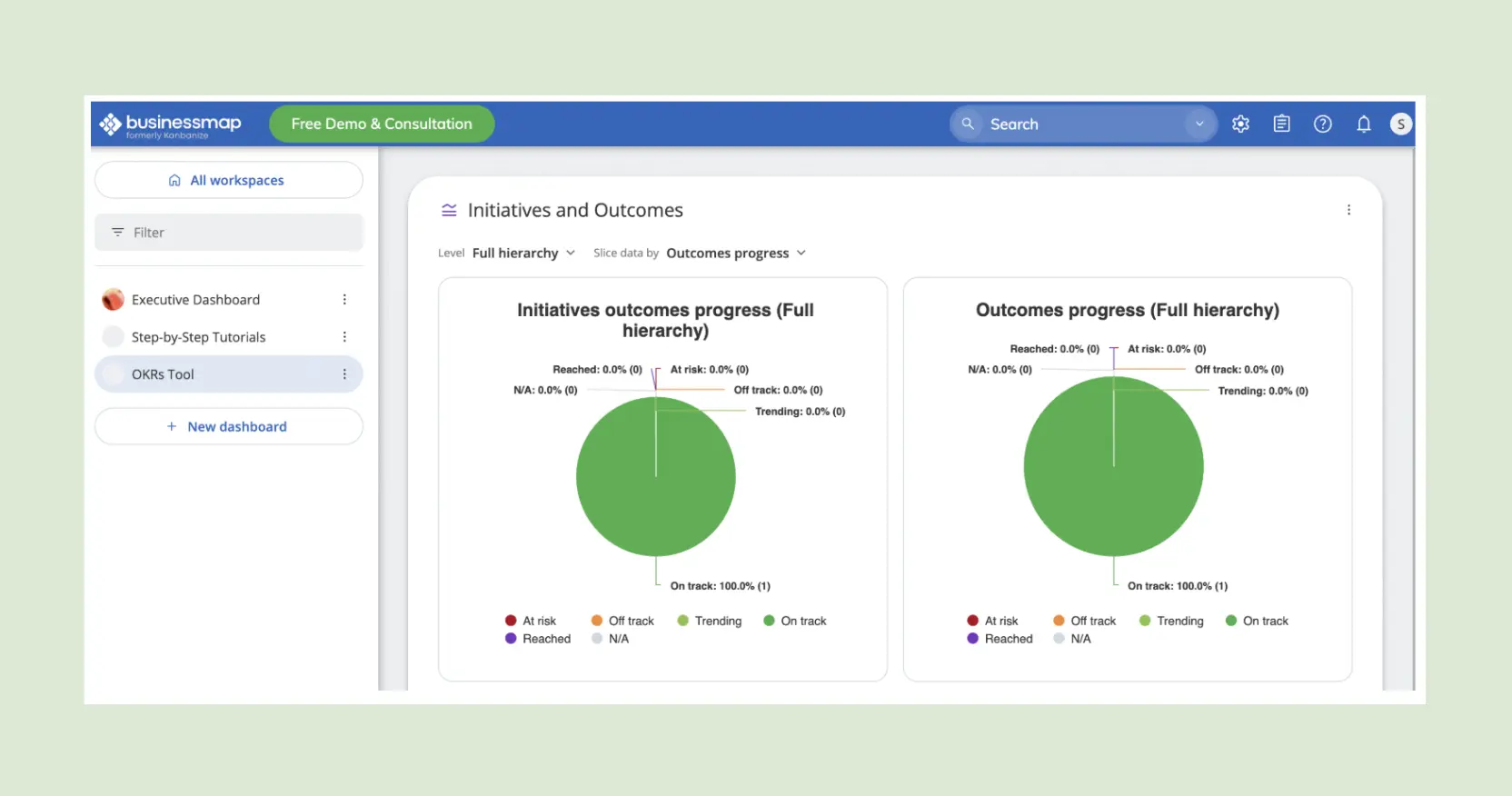
Businessmap fits perfectly for teams that need both OKRs and project/portfolio management in one place, without the fluff of enterprise suites.
Key features:
- Measurable OKRs + Outcomes Trend & Checkpoints: Define high-level initiatives as Objectives, attach measurable Outcomes as Key Results, and break them into checkpoints. Track deadlines, actual vs expected progress, and trends over time.
- Kanban + Workflow Management: Deep customization with Kanban boards, swim lanes, WIP limits, timelines, digital whiteboards, and portfolio tracking—tying every task back to OKRs.
- Robust Integrations: Connect effortlessly with over 300 tools - GitHub, MS Teams, Power BI, etc. - to sync work and goals.
What I liked
Businessmap is clean, intuitive, and surprisingly flexible. The widget library is a standout - offering one-click access to everything from workflow performance to initiative tracking and custom dashboards. It removes the guesswork from deciding what to monitor, making it easy to tailor the platform to your team’s needs right out of the gate.
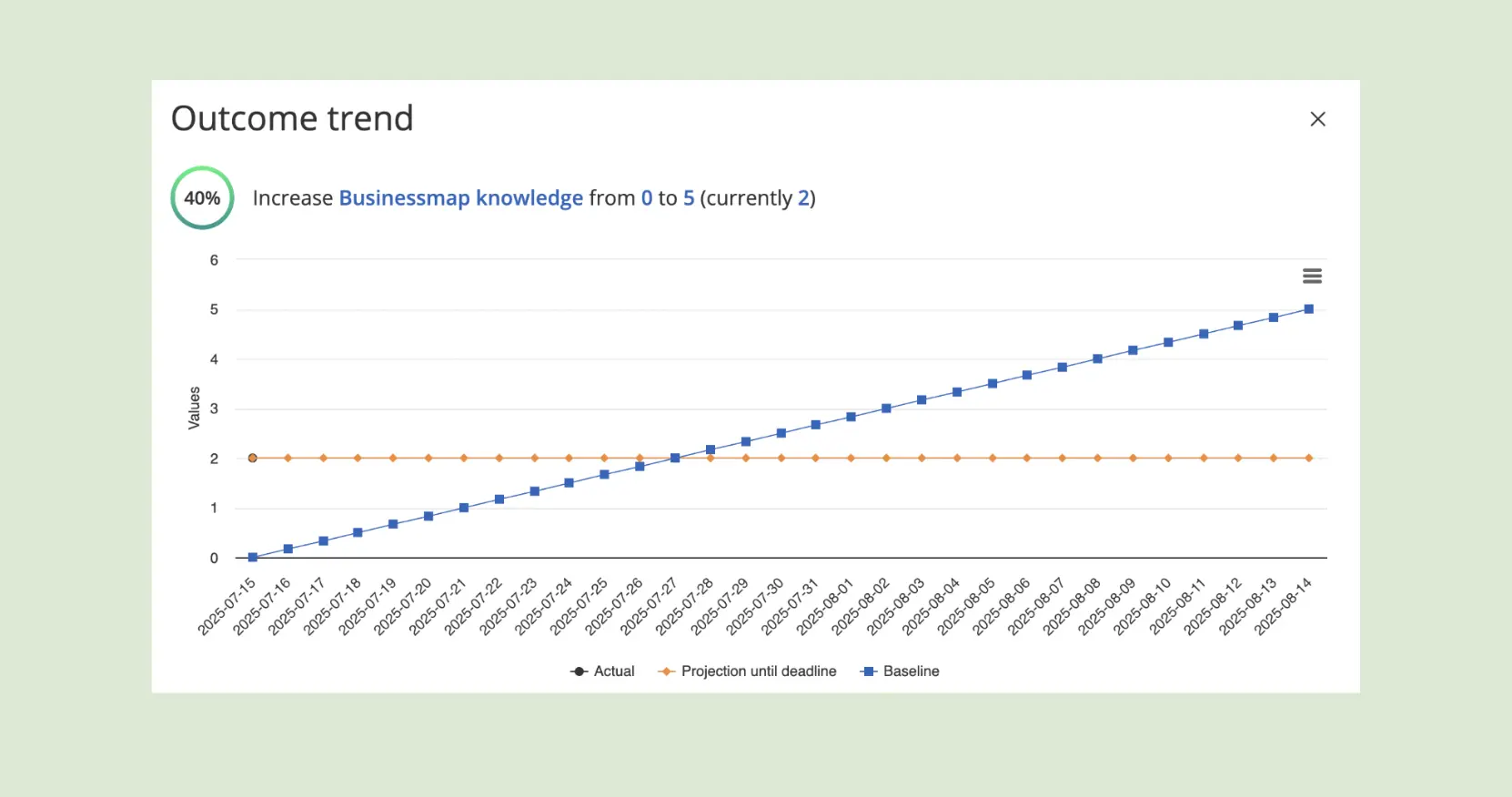
What could be improved
The overall interface feels a bit dated, and if you’re coming from a more modern OKR tool, there’s a learning curve. Navigating the deeper features - especially around workflows and board configurations - requires a bit of patience. Booking a demo with their team is probably the fastest way to get oriented and unlock the platform’s full potential.
Pricing:
Pricing starts from €10 per user, per month, but it looks like there’s a minimum of 15 users (approx. €150/ mo).
Free trial:
Yes, 14 days. No credit card required.
17. BOJA OKR
BOJA OKR is a clean, browser-based OKR platform that offers a surprisingly powerful experience despite its plain visuals. It’s ideal for small teams who want to get started with OKRs fast and value simplicity over flashy features.

BOJA is ideal for startups looking for a simple, no-frills OKR tool with unexpectedly deep reporting. It’s great for teams that want to launch quickly and get a clear view of performance, alignment, and progress without needing to configure too much.
Key features:
- Editable Demo Workspace: Start with pre-filled OKR examples that you can customize instantly - no setup or onboarding delay.
- Alignment & Performance Reports: View how teams and objectives align with company strategy, and track key results across time.
- Custom Report Builder: Create your own reports based on progress, check-ins, owners, or OKR status.
What I liked
Despite being free, BOJA offers detailed reporting on alignment, performance, and weekly progress - all exportable and easy to share. For small teams that want clarity without clutter, it delivers a solid experience.
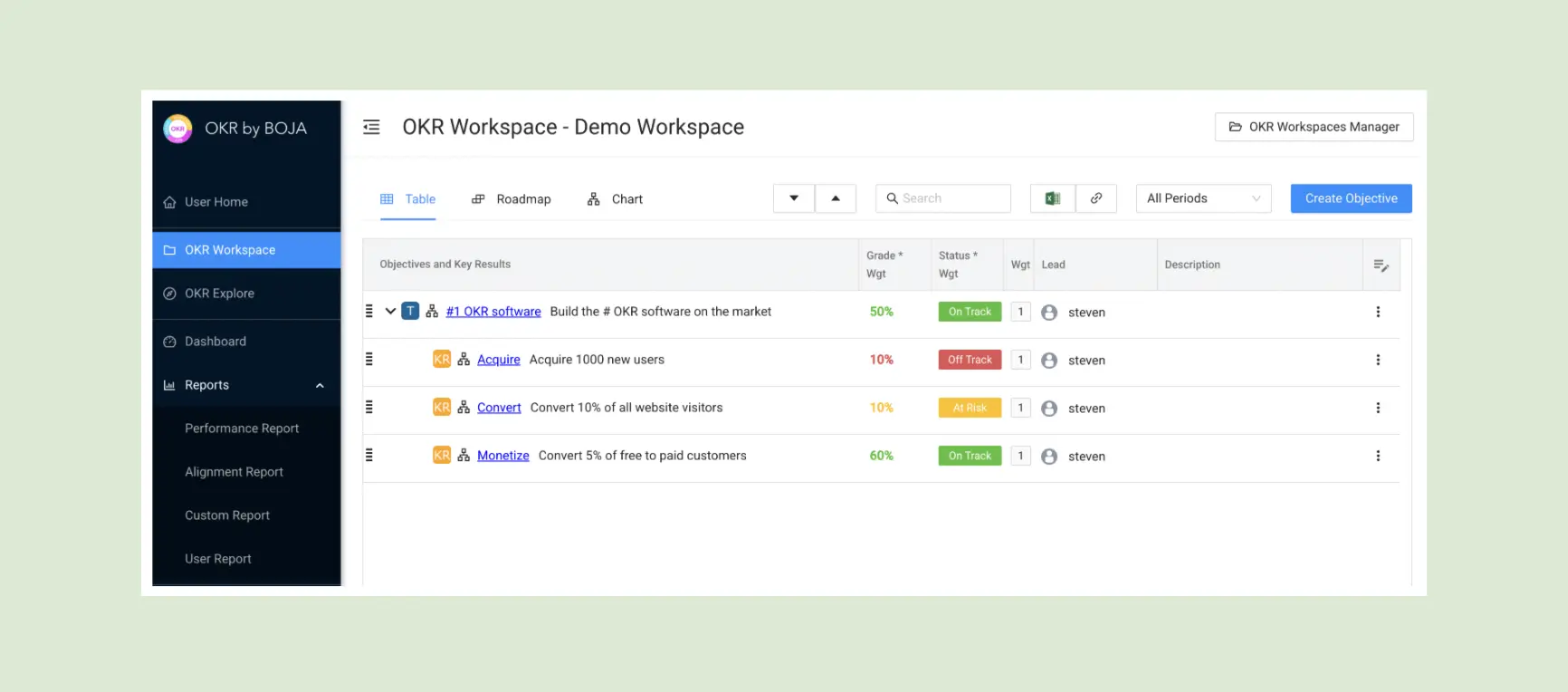
What could be improved
The biggest drawback is the design. The sign-up page and dashboard feel outdated - closer to a spreadsheet than a modern SaaS UI. While it doesn’t impact functionality, it may create the impression that the product is less capable than it really is.
Pricing:
Free
Free trial:
No trial required - just sign up and start using it.
18. Effy AI
Effy AI is a lightweight performance management and OKR platform that brings AI-powered performance reviews, goal tracking, and 360° feedback into a simple workspace. It’s designed to give small and mid-sized teams structure without the overhead of enterprise HR systems.

Best for startups (2–20 users) that want fast, automated reviews and goal alignment in a tool that feels simple and approachable, without the burden of complex HR features.
Key features:
- AI-Generated Templates: Auto-filled summaries help create reviews in minutes.
- 360° Feedback: Collect peer, manager, and direct report input in one place.
- Goal + OKR Tracking: Tie objectives and key results directly into performance plans.
What I liked
Effy AI is extremely easy to use - onboarding a team takes minutes, and the AI-generated templates reduce review-writing fatigue. I really liked the structured employee review form with clear rating scales and follow-up prompts, which makes evaluations quick yet thorough.

What could be improved
The platform is clearly built for smaller teams. It lacks some advanced HR features like 1:1 meeting threading, robust analytics, or deeper OKR dashboards that larger organizations may need. Integrations are limited beyond Slack, which could be a blocker for more tool-heavy setups.
Pricing:
Free for up to 5 users. Paid plans scale for larger teams.
Free trial:
Yes.
19. Futureworks
Futureworks is a strategy execution and OKR platform built to help mid-sized and enterprise teams turn strategic plans into weekly action. With built-in meeting workflows, a visual strategy map, and upcoming AI coaching, it focuses on driving alignment and accountability without adding complexity.
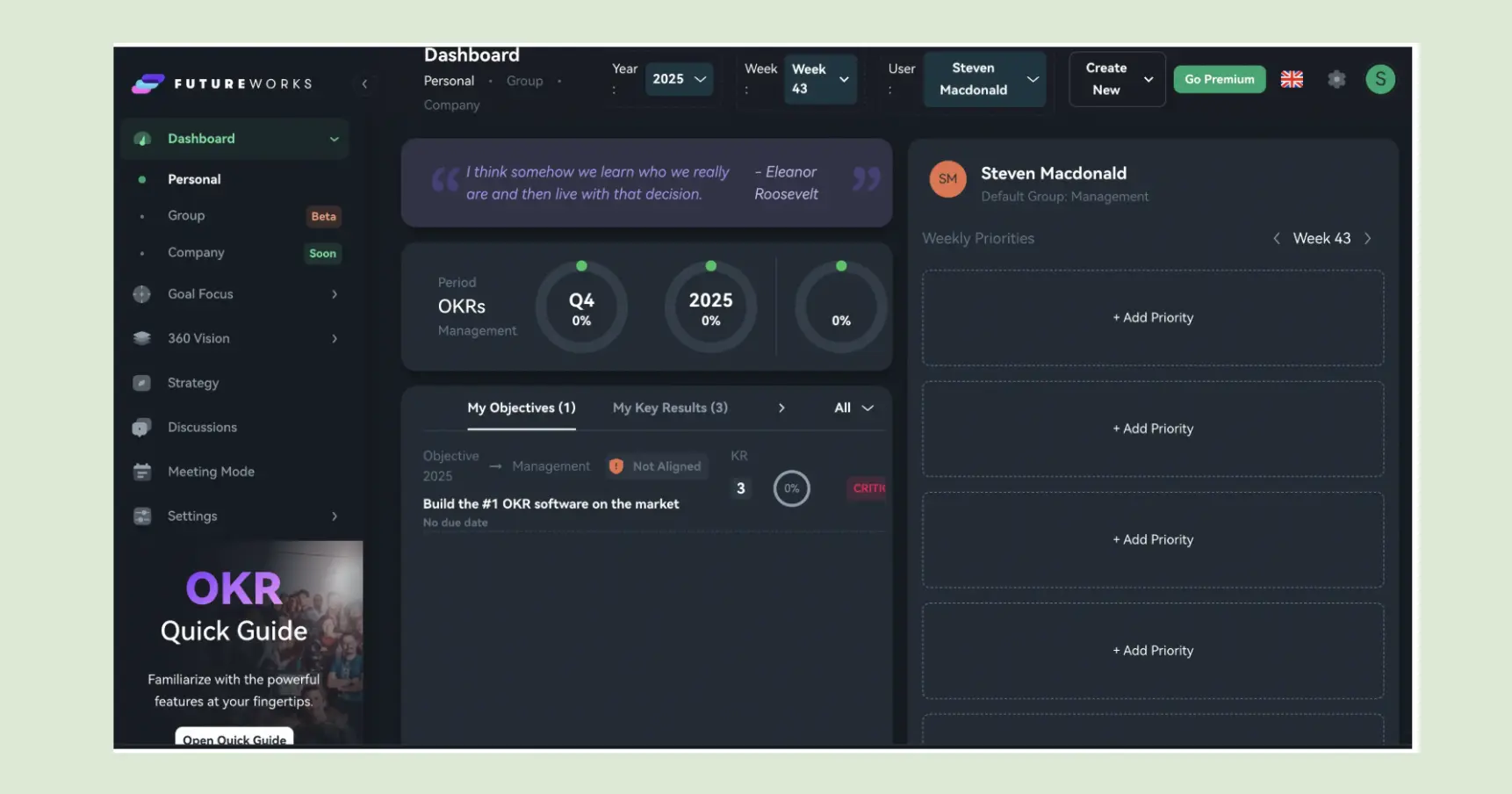
Best for orgs (10+ users) in hybrid or structured environments that want clear top-down alignment, habit-forming check-ins, and a blend of intuitive design with real organizational depth.
Key features:
- Strategy Map: Connect vision, goals, and OKRs in one view to ensure every team sees how their work fits into the bigger picture.
- Meeting Mode: Run streamlined OKR check-ins with built-in live agendas and weekly prompts.
- 360° Vision Dashboard: Track KPIs and OKRs in a unified space with visual progress bars and real-time status updates.
What I liked
Futureworks makes execution part of your routine instead of just another tool to check. The Strategy Map is particularly strong - it's simple but powerful for top-down clarity. The built-in Meeting Mode helps reinforce habits without extra overhead.
I also appreciated the real-world grounding: it’s clearly designed for organizations that care about accountability, not just goal tracking. You’re nudged to stay focused each week, not just at quarter’s end.
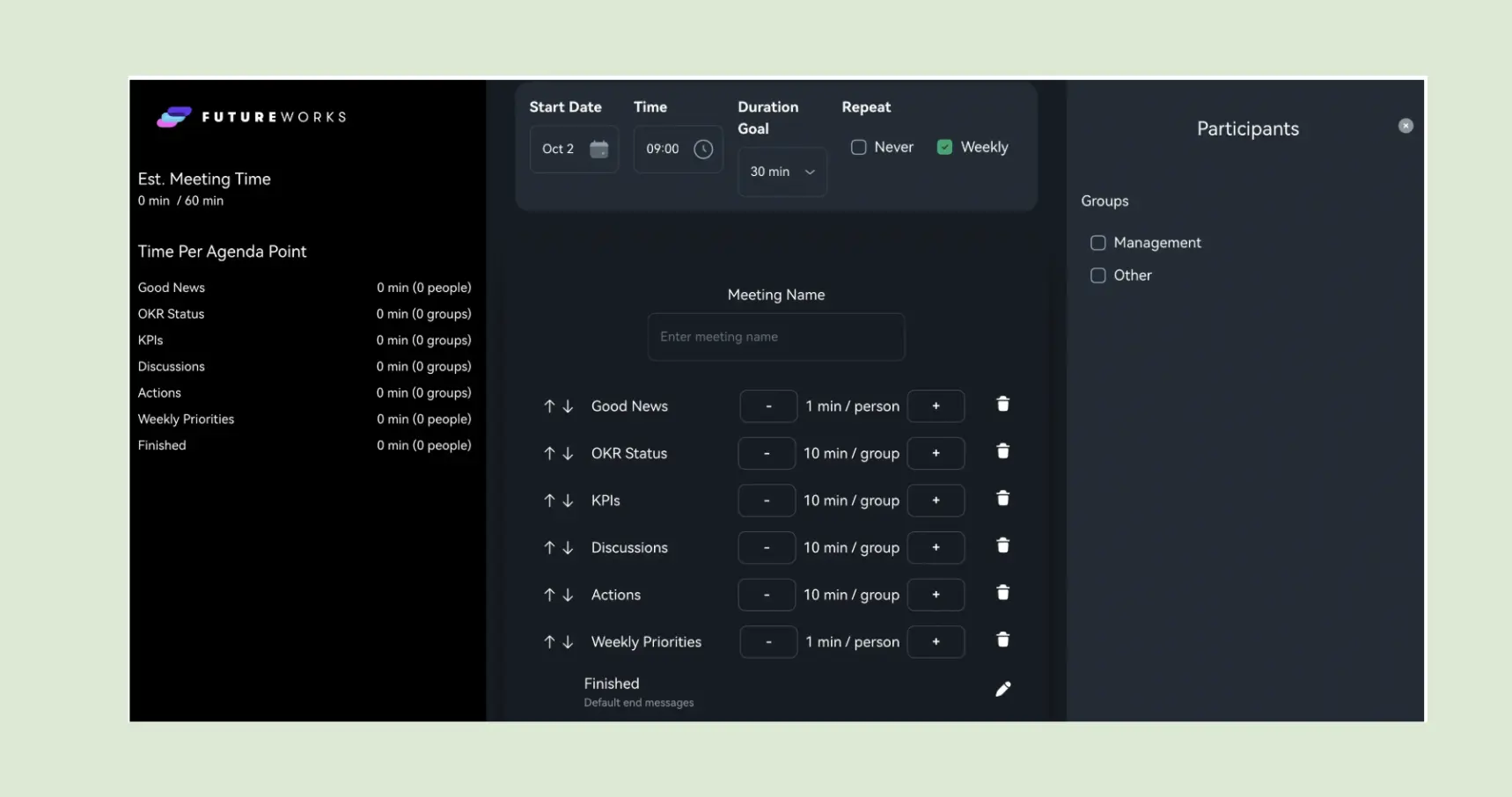
What could be improved
Some promising features - like the AI Coach and Connectors - are still marked “coming soon.” And while there is a free plan for small teams (up to 5 users), the jump to premium pricing starts at €13/user/month, which may be a hurdle for smaller orgs evaluating tools.
Pricing:
Free for 1–5 users. Paid plans start at €13/user/month for teams of 6–50. Discounted tiers available for larger organizations.
Free trial:
No trial required for the free tier. Paid plans start only when you exceed 5 users. No credit card needed for basic access.
20. Profit.co
Profit.co is a full OKR and performance-management platform built for teams that want OKRs, KPIs and employee reviews all in one place. It’s designed for growing companies that need structure, visibility and HR-friendly features without jumping between separate tools.
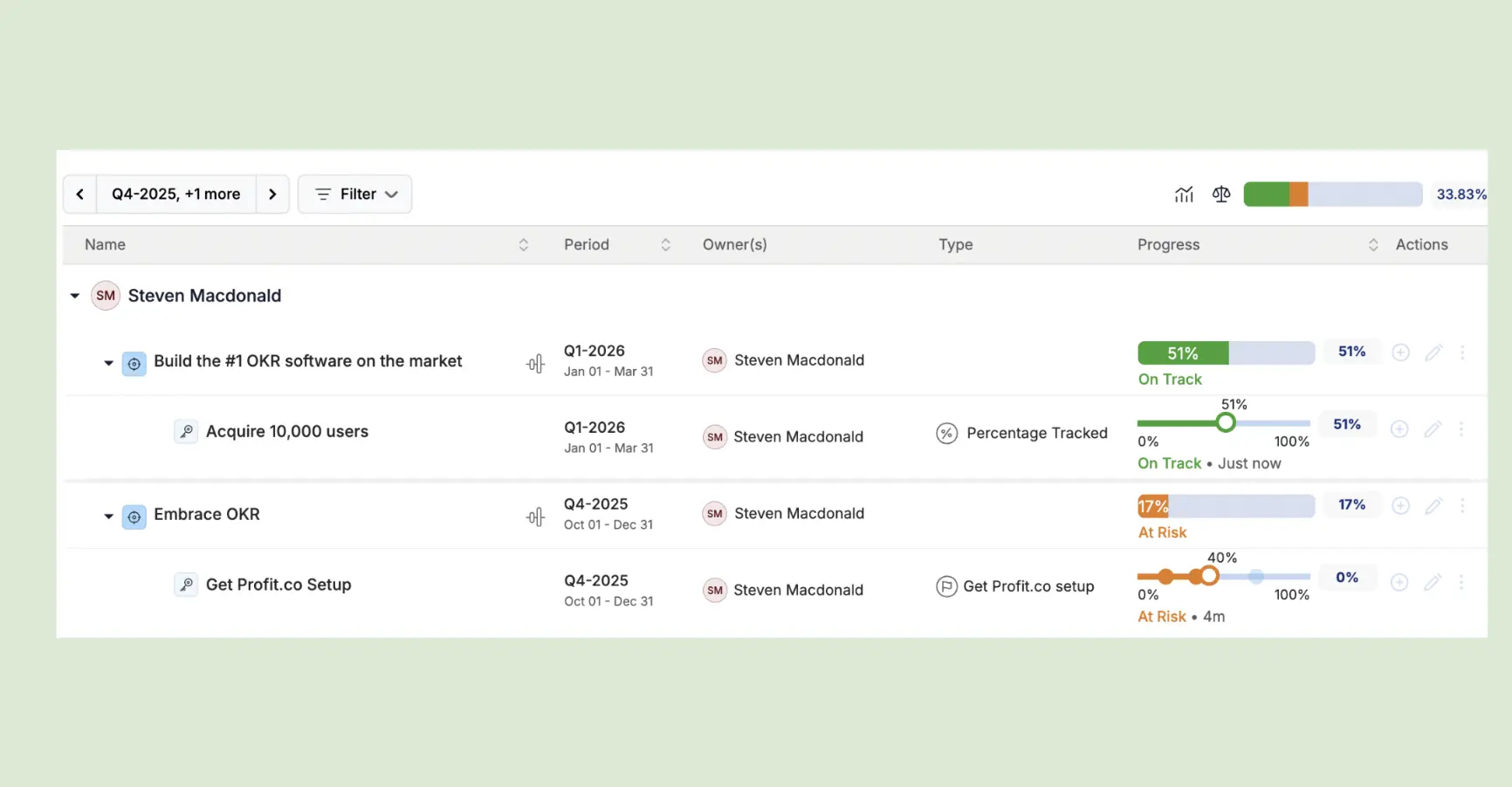
Profit.co is best for startups that want to track OKRs and KPIs together while also handling performance reviews and 360° feedback. It’s more comprehensive than lightweight OKR tools and works well for teams that prefer an all-in-one approach.
Key features:
- Weighted OKR progress: Add weights to key results for more accurate scoring.
- OKRs + KPIs: Track both in the same workflow.
- Performance management & 360°: Built-in reviews and feedback tools for HR.
What I liked
Weighted OKR progress is really useful. The performance-management and 360° tools are great additions for HR teams. I also found some surprisingly powerful features in the admin area - like Strategy Roadmap, Surveys and Meetings - but you have to toggle them on first to see them.
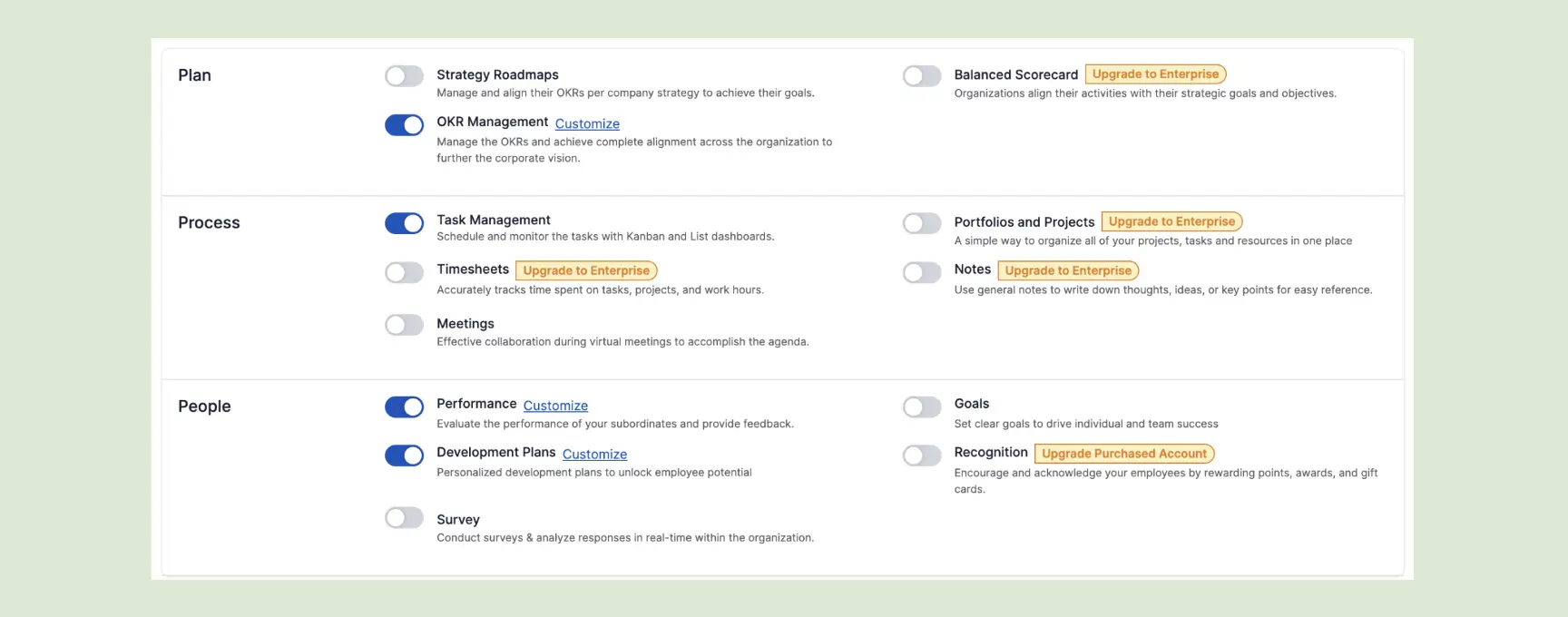
What could be improved
The loading time wasn’t great. It took more than 20 seconds to reach the dashboard after signing up, even without onboarding. The platform also wasn’t as intuitive as I expected. Some menu items, like OKRs Program Status and Cockpit, were confusing and sometimes just empty with no clear next step.
Pricing:
Not listed publicly - you need to request a quote.
Free trial:
Yes, free for 30 days.
21. The North
The North is a goal-setting and OKR platform aiming to help teams and companies move from “to-do lists” to measurable outcomes. It supports strategy alignment, OKRs and initiatives, and encourages data-driven progress tracking.
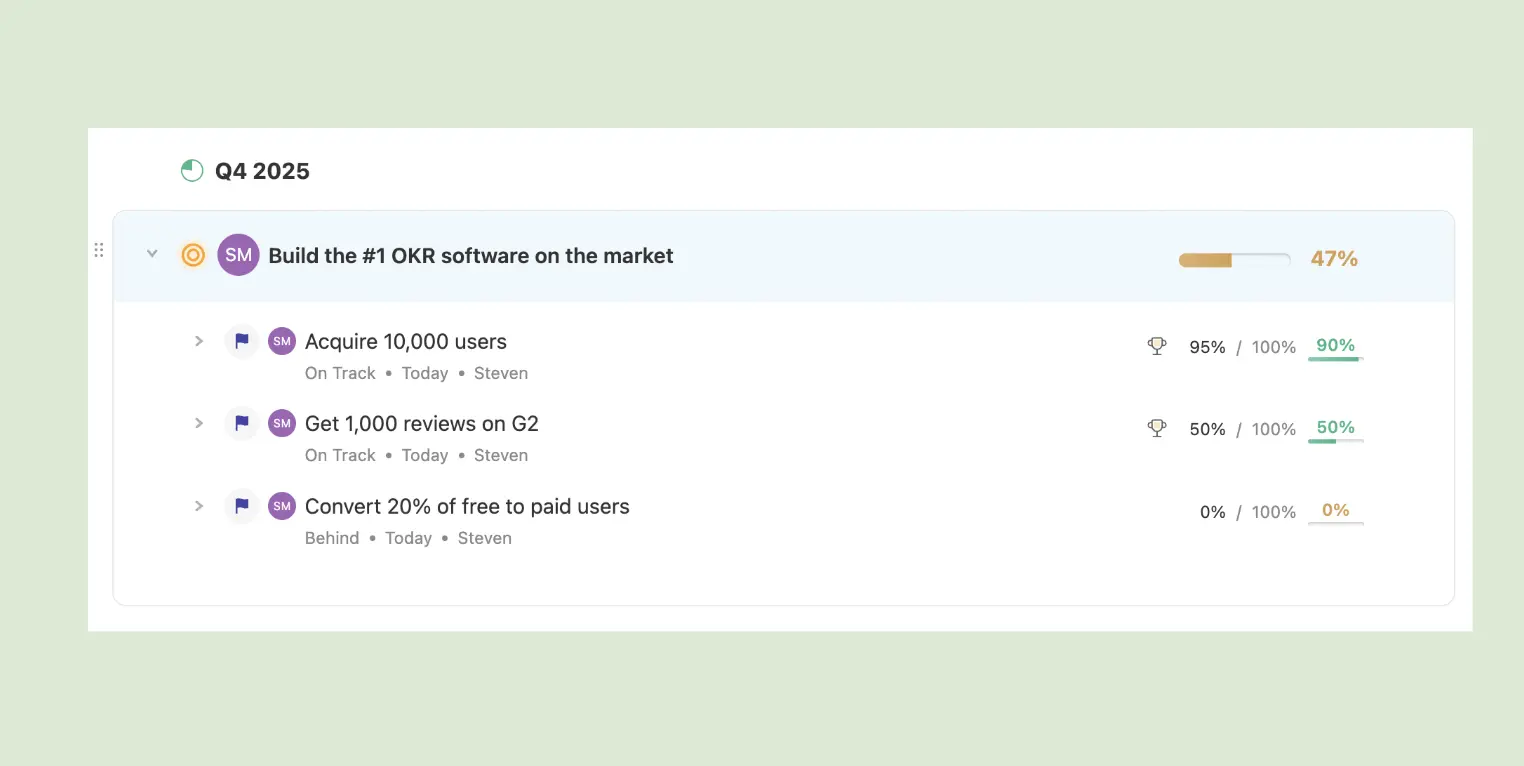
The North is best for small to mid-sized teams (especially early-stage or data-driven teams) that want a simple, clean OKR tool with metric-driven goals and a path toward more sophisticated strategy execution.
Key Features:
- Strategy & goal alignment: define overall company goals and link team/individual OKRs to them so everyone sees how their work contributes to broader outcomes
- Metric-based OKRs: The North emphasizes measurable targets and initiatives tied to metrics - making it easier to track real impact vs. just tasks.
- Initiatives & project tracking: lets you connect day-to-day work (“initiatives”) to key results, which helps ensure work actually moves the needle
What I liked
Sleek interface, easy to navigate, and a nice dashboard that gives a quick overview of team or company performance. The “try demo account” feature - where you can jump into a pre-populated demo environment (with example OKRs, initiatives, and reports) instead of staring at an empty dashboard - is especially nice (though I almost overlooked it).
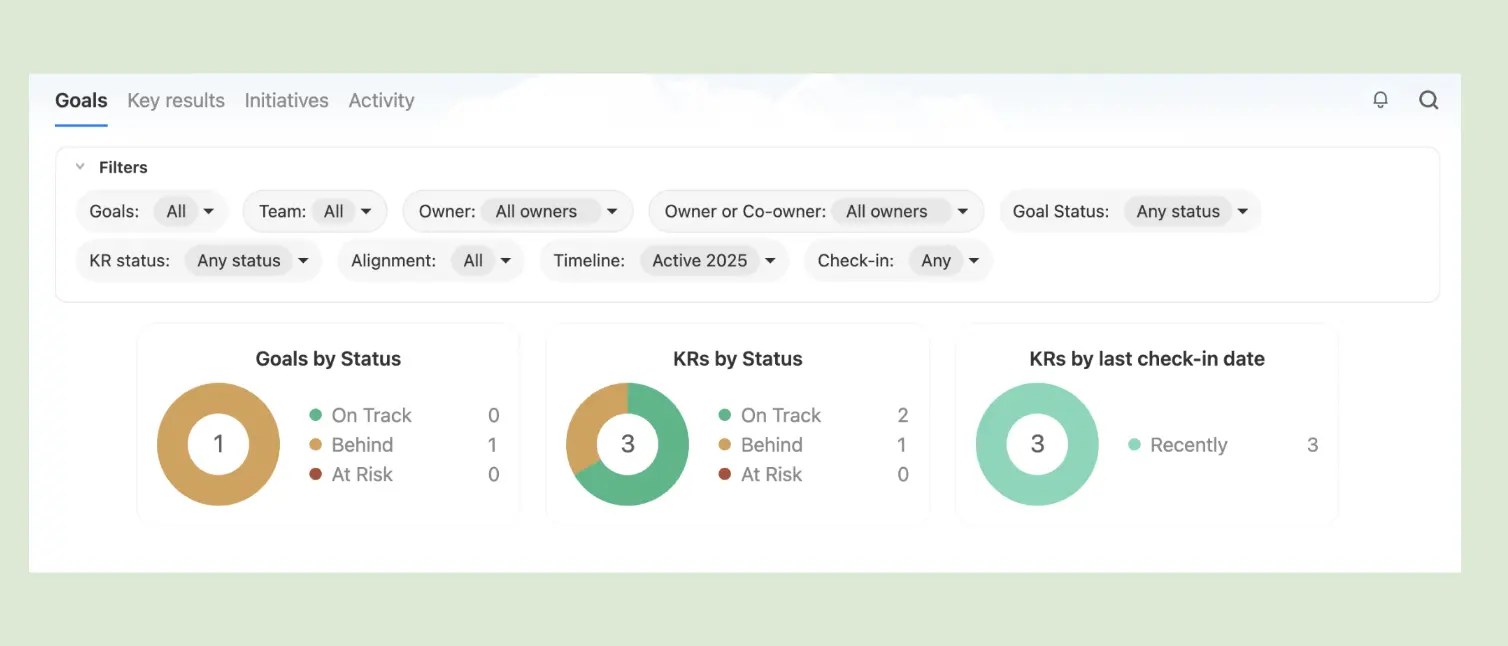
What can be improved
Onboarding can feel long: after sign-up you have to fill in profile info, figure out the setup, and follow tips to use the tool properly. And updating progress feels manual - you need to click into each Key Result (KR) to check in and update progress.Also, admin features are hidden behind what’s labeled “Free plan,” which might confuse new users looking for admin controls.
Pricing:
Free for up to 5 users; then US $7 per user per month.
Free trial:
Yes.
22. Week Plan
Week Plan is a personal productivity and OKR tool focused on weekly planning, priorities, and execution. It combines lightweight OKRs with task management and time-blocking, making it a better fit for individuals or very small teams rather than fast-scaling startups.
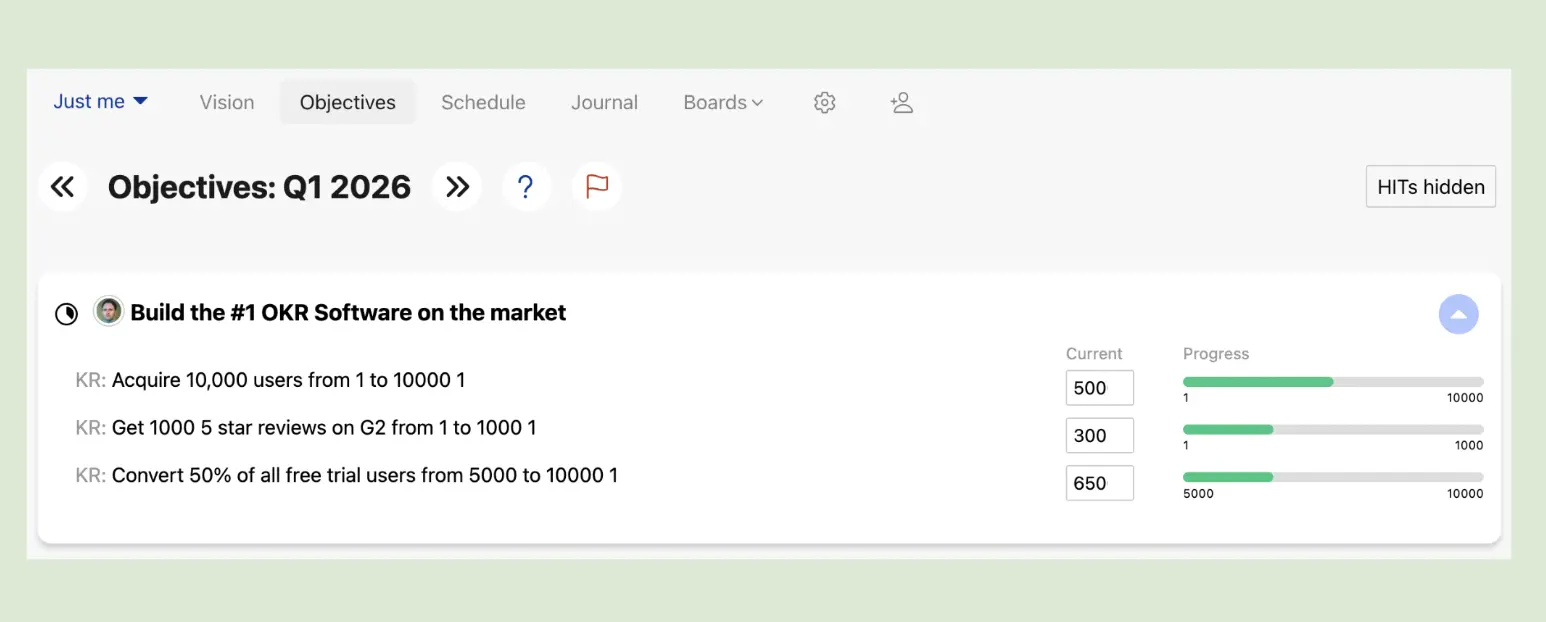
Week Plan is best suited for founders, solo operators, or teams of up to three people who want to link goals directly to their daily work and calendar instead of running company-wide OKR programs.
Key Features:
- Personal & Small-Team OKRs: Create personal or team OKRs and connect them directly to weekly priorities and tasks.
- Google Calendar Integration: Seamlessly sync tasks, OKRs, and projects with Google Calendar to support time-blocking and execution.
- Multilingual Support: Available in multiple languages (including Polish, French, and Spanish), which is unique among tools on this list.
What I liked
Week Plan feels much more personal than traditional OKR tools. The Parking Lot is useful for keeping ideas organized without cluttering active work. The standout feature is the Google/ Outlook Calendar integration, which makes it easy to turn OKRs into scheduled, actionable work.
What could be improved
The UI feels dated, with a lot of information displayed at once. Some screens show menus, inboxes, and settings simultaneously, which can be confusing. The product also doesn’t appear to be updated frequently, so feature requests may take time to materialize.
Pricing
Free for personal use; paid plans start at around $10 per user per month.
Free trial
Yes.
23. Nimble
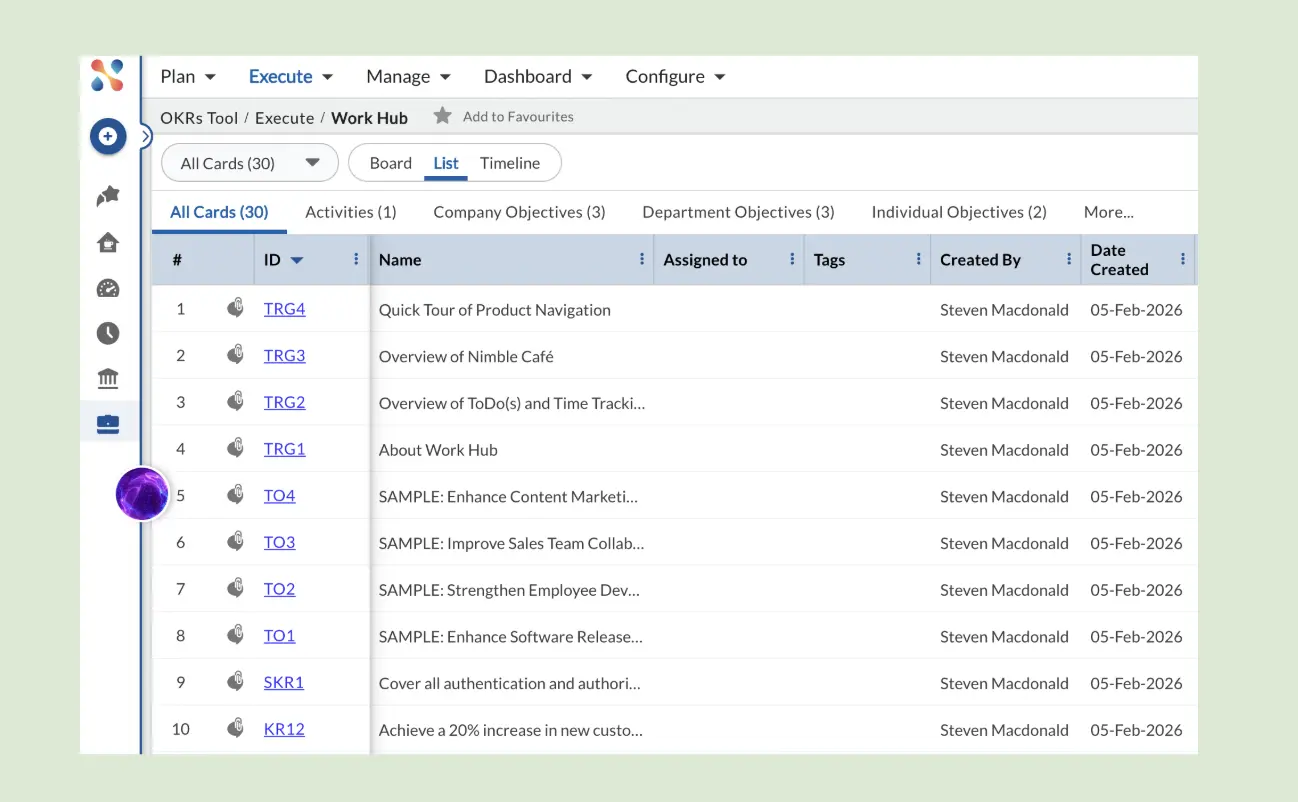
Nimble is an enterprise work and portfolio management platform that includes OKRs as part of a much broader system. Rather than being a dedicated OKR tool, it’s built for organizations that want to connect strategy, execution, and delivery across portfolios, programs, and teams.
Nimble is best suited for large enterprises with complex structures that want OKRs tightly linked to initiatives, delivery workflows, and long-term strategic planning - not for teams looking for a lightweight, OKR-first experience.
Key features:
- Enterprise OKRs & Strategy Management: Create OKRs and connect them to strategic themes, initiatives, and portfolios.
- Portfolio & Work Management: Tie OKRs directly to real work across teams, programs, and delivery pipelines.
- Dashboards & Analytics: Visual dashboards to track OKR performance, progress, and alignment at scale.
What I liked
The OKR dashboard is strong. With sample data in place, it’s easy to see which OKRs are exceeding expectations, which are behind, and which need attention. The bar charts showing different OKR types give a clear, executive-level snapshot of what’s currently in motion. From a reporting and visibility standpoint, this part is very well done.
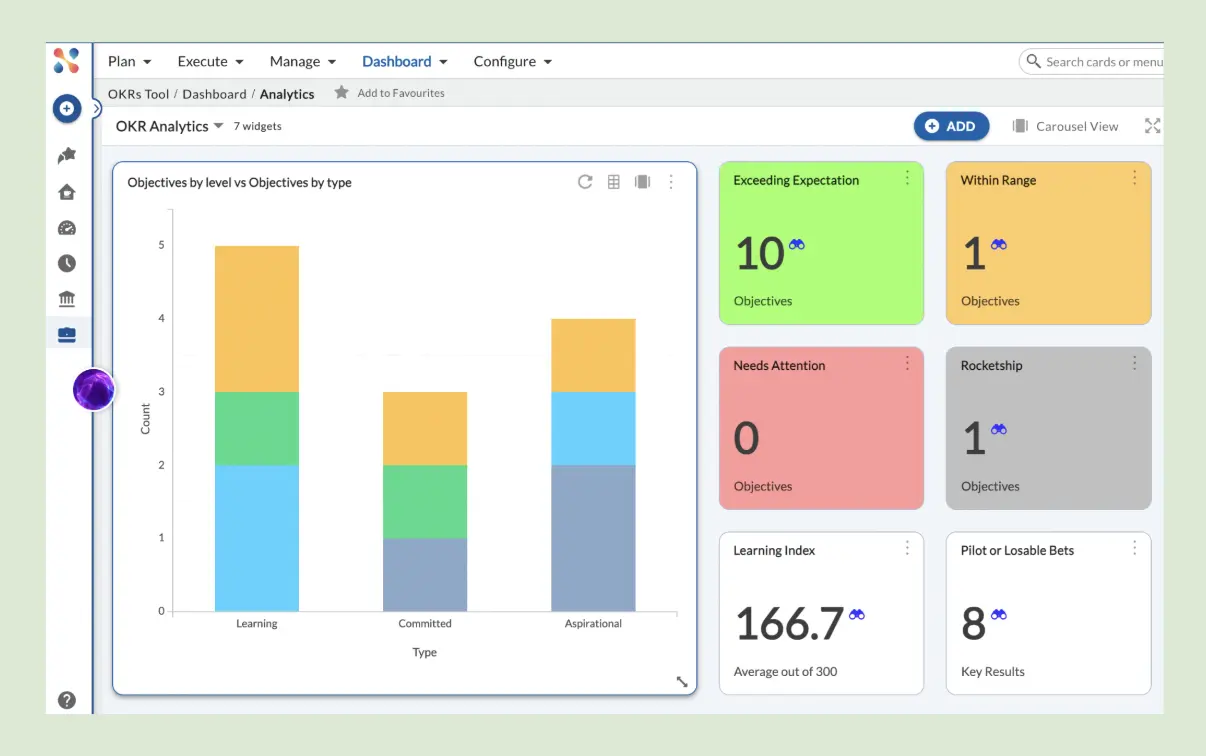
What could be improved
Finding where to actually add OKRs took far too long after signing up, and frequent video pop-ups made onboarding frustrating. When I finally reached the OKR section, I was met with both sample and non-sample OKRs - even though I hadn’t created anything - which was confusing.
The UI also feels really dated, and I ran into an error when trying to add a new OKR, which completely blocked progress.
Pricing:
Starts at $10 per user, per month (team plan). Higher-tier plans available.
Free trial:
Yes (30 days).
24. Hive
Hive is a project management platform that includes a dedicated Goals app for setting, tracking organizational goals alongside daily execution. Instead of a standalone OKR tool, Hive embeds goal tracking into the workspace you already use for projects and tasks.
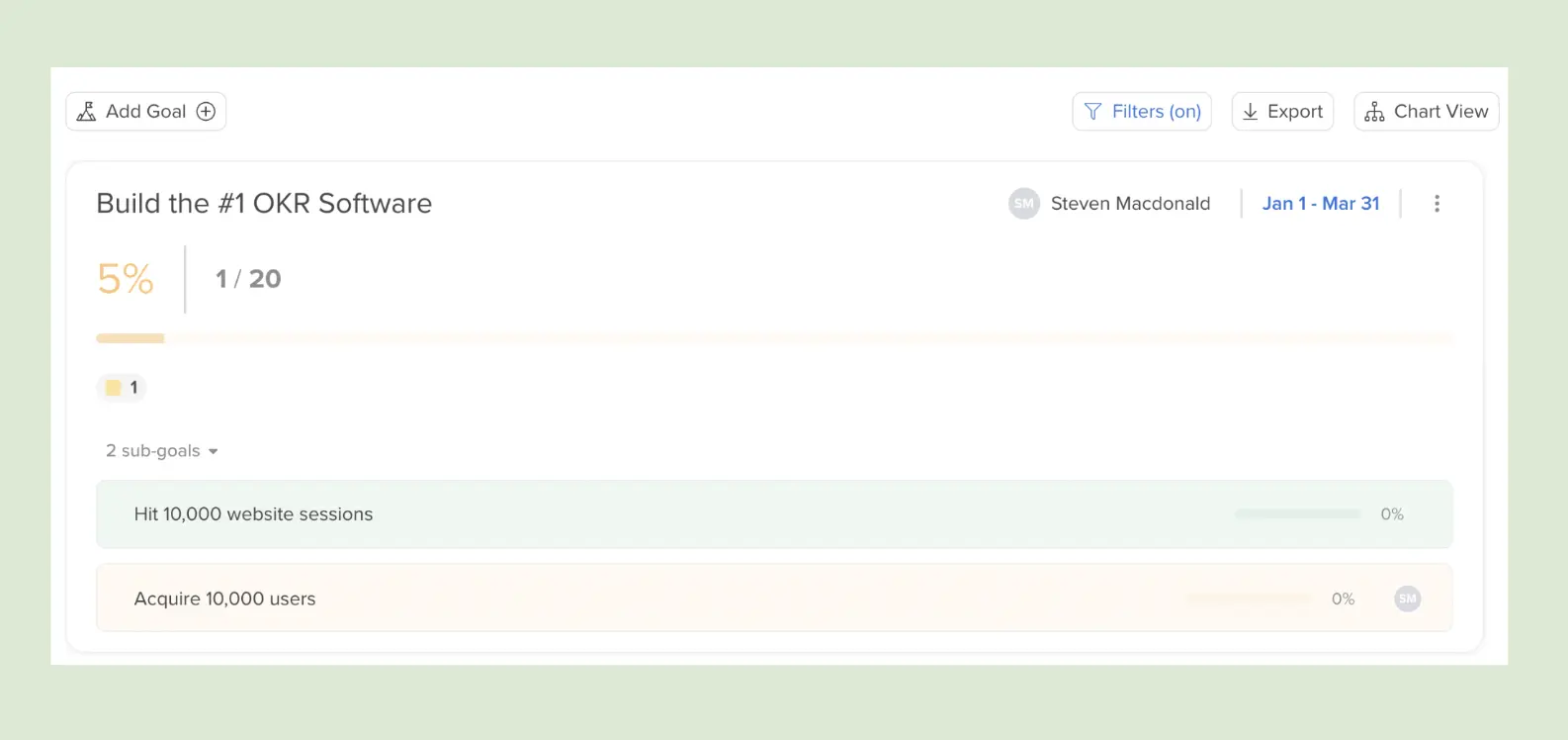
The Goals app helps you centralize goals in one place, monitor progress via color-coded status indicators, and connect goals to work that’s already happening in your projects.
Key features:
- Goal creation & ownership: set goals, assign owners, and define time ranges.
- Progress tracking: track based on completed actions (automatic) or numerical values you update.
- Sub-goals & visibility: nest goals and see “on-track / at risk” status at a glance.
What I liked
Once inside the dashboard, navigation is straightforward and easy to follow. Creating goals at the top feels intuitive, and the quick export option to download goals as a CSV is genuinely useful. I also liked the quick-view alignment map, which shows how goals connect without navigating elsewhere in the platform.
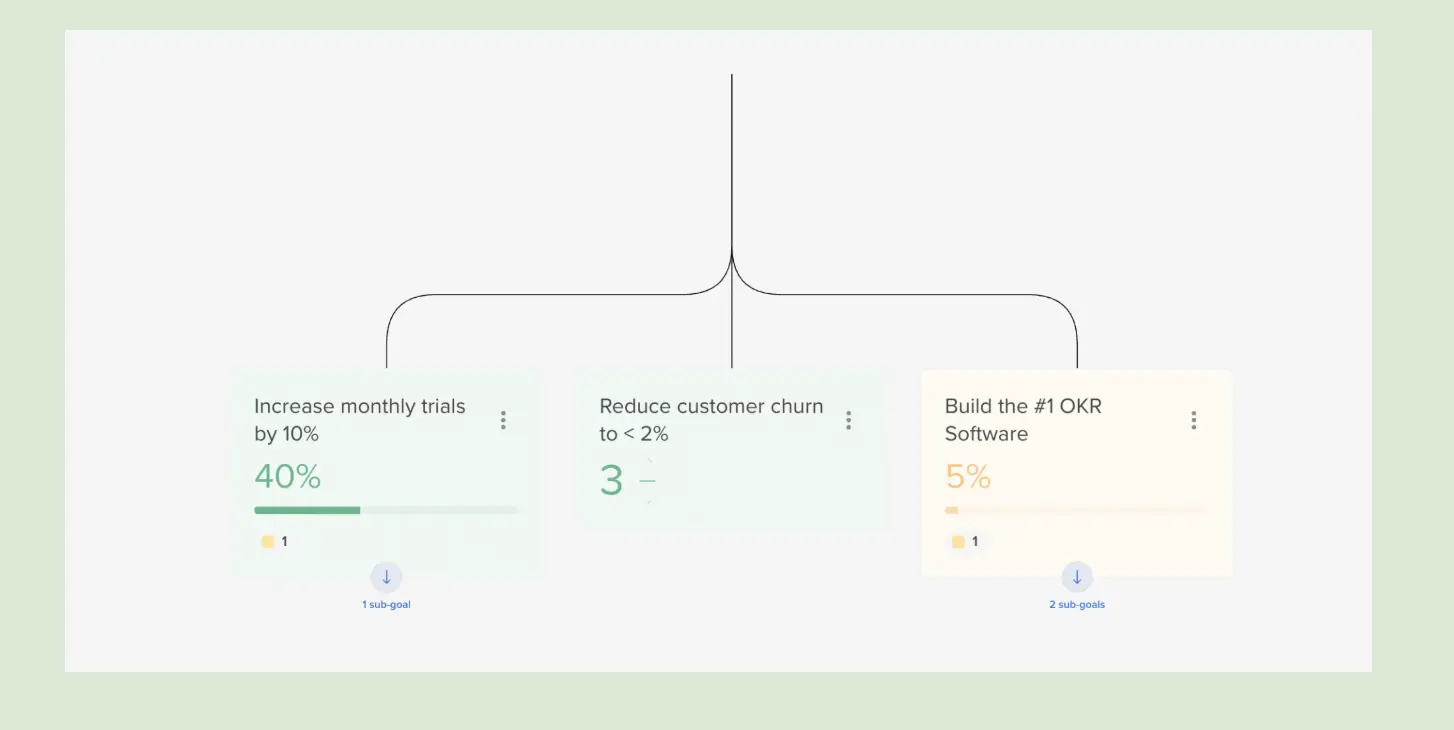
What could be improved
The onboarding felt long before reaching the dashboard, and updating KR progress wasn’t clear beyond adjusting confidence levels. Some wording felt slightly off ("unstarted"), and after creating and assigning a goal, it didn’t automatically appear on my dashboard.
Pricing:
Hive has a free plan for up to 10 users, but the Goals feature is only included in their paid plans (starting from $3 per user per month).
Free trial:
Yes.
So...What's The Best OKR Software?
Here’s a breakdown of the best OKR software tools, categorized by key strengths.
1. Best for Startups: OKRs Tool
Why it's the best: OKRs Tool is designed specifically for startups, offering simplicity and team-based goal tracking. It stands out due to its easy-to-use interface, minimal setup, and real-time progress tracking. It's built for teams that want to stay aligned without dealing with the complexity often associated with larger tools.
2. Best for Cost-Effective Scaling: SimpleOKR
Why it's the best: SimpleOKR offers an affordable, one-price model with unlimited users, making it an ideal choice for early-stage startups looking to scale without high costs. While the platform is basic, it’s incredibly cost-effective for growing teams, offering a straightforward approach to goal setting with no extra frills.
3. Best for Microsoft Teams Users: Teamflect
Why it's the best: Teamflect is purpose-built for Microsoft Teams, letting you manage OKRs, feedback, and performance reviews without leaving your workspace. Its seamless integration, visibility controls, and progress filters make tracking simple and intuitive. For organizations invested in Microsoft, Teamflect offers an all-in-one solution to align goals and boost performance right where teams already collaborate.
To re-cap, here's a table that compares all three:
Quick notes:
- We didn’t include anything about Viva Goals, since it’s closed down at the end of 2025.
- We only included platforms that offered a free trial. Popular tools like Workboard, Lattice, and Betterworks didn’t make the list - not because they’re bad, but because they required a sales demo to explore. We wanted to focus on tools you can test right now.
Still using Spreadsheets for OKR Tracking?
Despite the popularity of modern OKR software, tools like Google Sheets and Microsoft Excel are still the go-to for a surprising number of startups.
In fact, our own research shows that 65% of early-stage teams still track OKRs in Excel or Google Sheets. And honestly? That makes sense.

Spreadsheets are free. They're flexible. You can build your own template, share it quickly, and avoid yet another subscription. For small teams just getting started with OKRs, it’s a perfectly reasonable place to begin.
But here’s the truth: what works for 10-20 people doesn’t scale to 100-200.
Spreadsheets can’t send reminders, show real-time updates, or surface what's off-track. They’re great for storing goals - but not for running them. And as your team grows, so does the friction: missed updates, scattered context, and check-ins that feel more like detective work.
If you’ve outgrown the spreadsheet stage, you’ll feel it.
That’s when it’s time to switch from “just tracking goals” to actually using them to run your business.
The Right Software Is the One That Helps You Grow
After testing all 24 platforms, one thing’s clear: there’s no perfect OKR tool - only the one that fits your stage, team, and workflow.
Some are built for scale. Others shine in simplicity. A few look great but fall short when it comes to actual progress tracking.
But if there’s one thread running through all of this, it’s that your OKR system should serve your team - not the other way around.
Whether you pick OKRs Tool, something else on this list, or start with a spreadsheet - it’s less about the tool and more about what it helps you do: Set sharper goals. Stay focused. And actually make progress.






